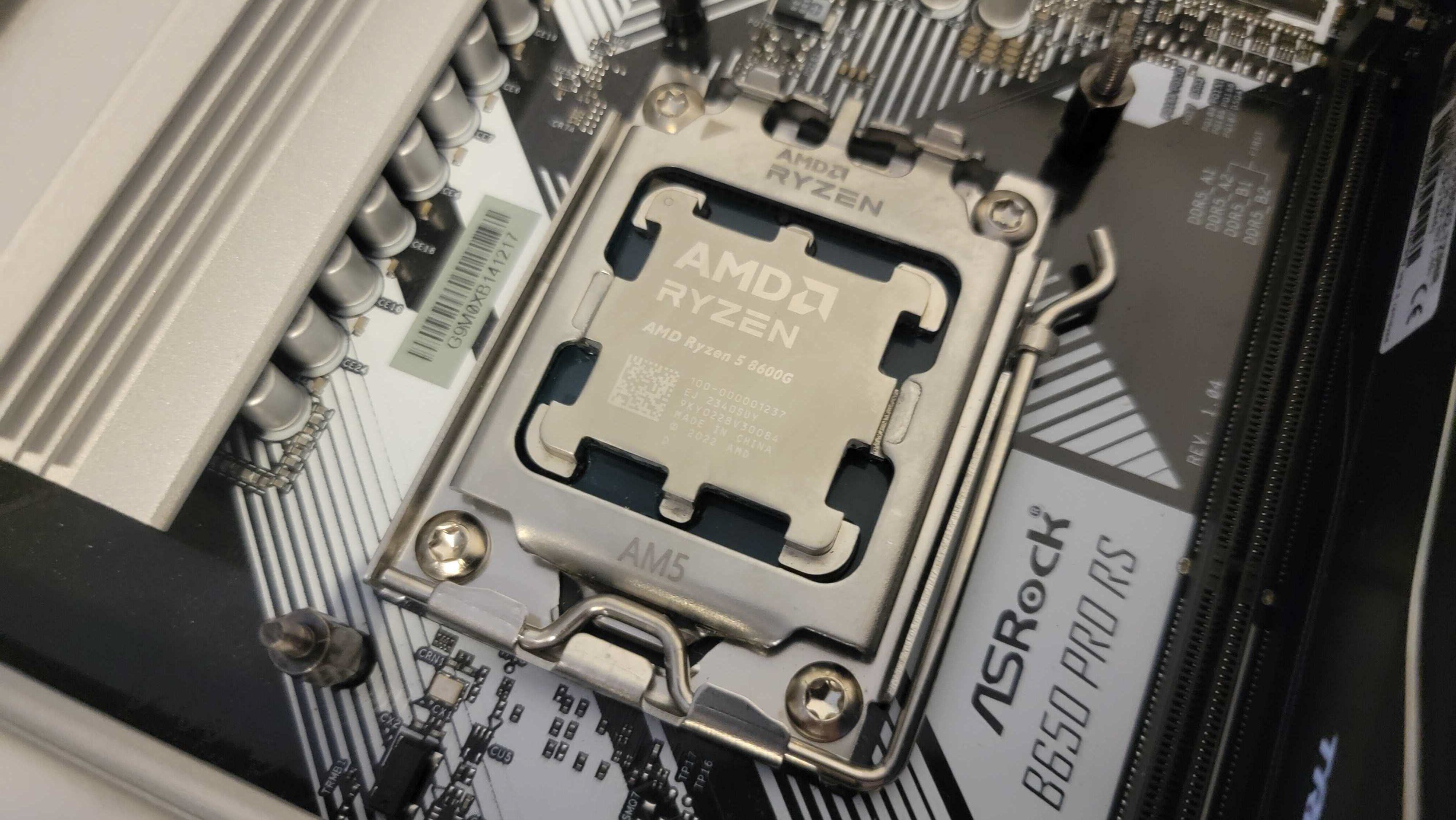Why you can trust Tom's Hardware
AMD Ryzen 5 8600G Application Benchmarks, the TLDR:
We boil down productivity application performance into two broad categories: single- and multi-threaded. These slides show the geometric mean of performance in several of our most important tests in each category, but be sure to look at the expanded results below for more granular analysis.
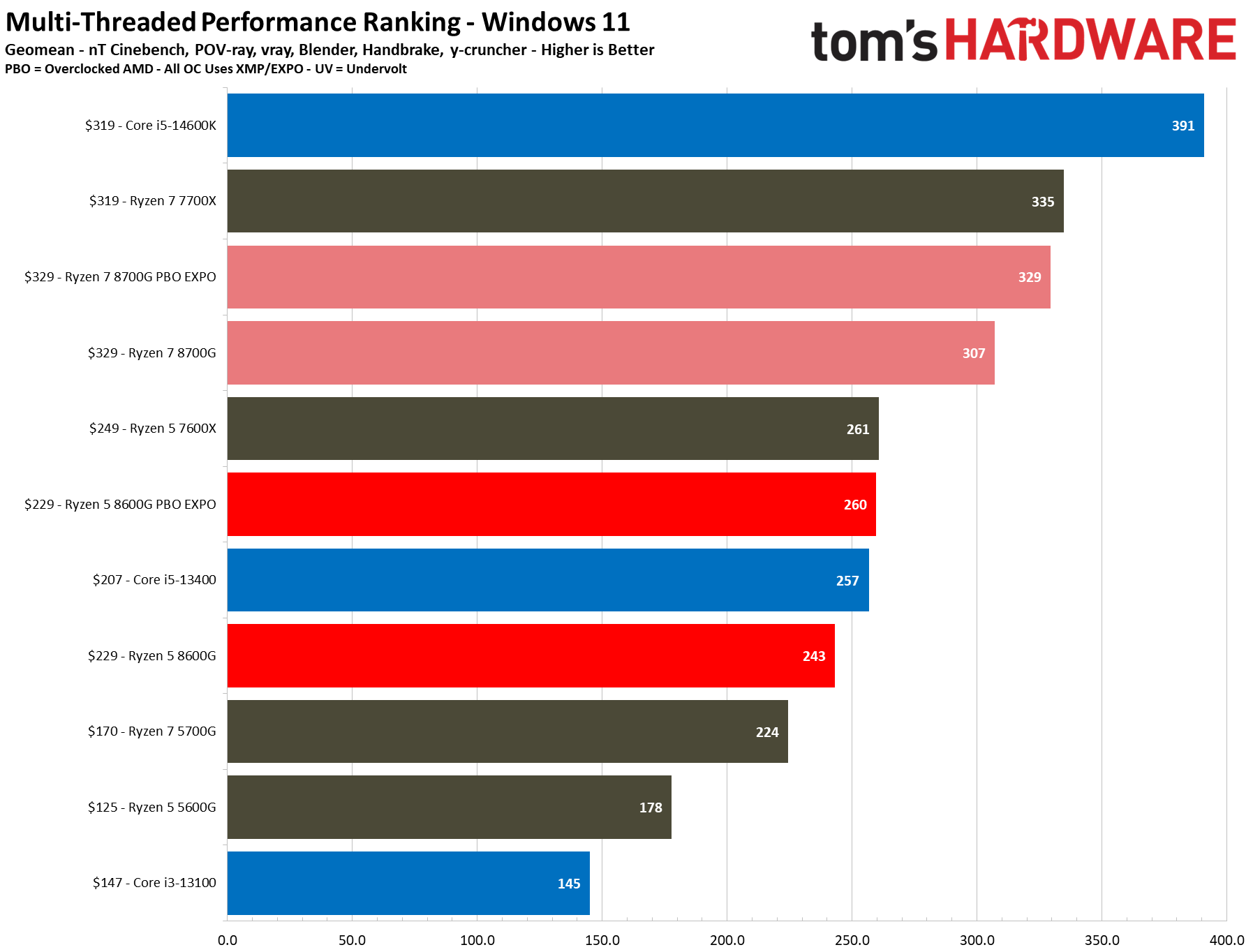
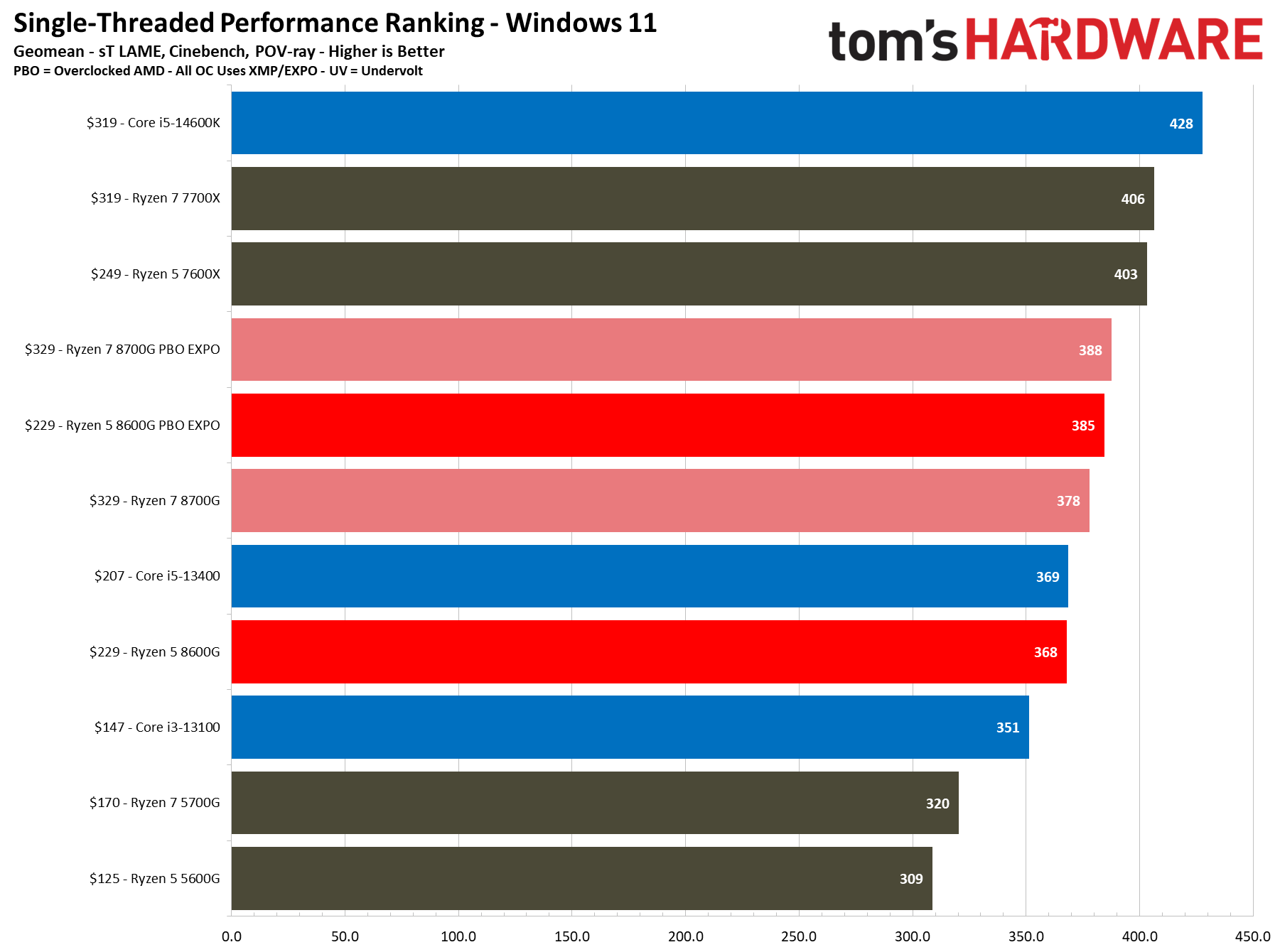
The Ryzen 5 8600G is clearly focused on gaming rigs but will also be used for more general-purpose workloads. However, similarly-priced processors designed primarily for standard PC work deliver more performance in CPU-bound workloads — you get fewer CPU cores and lower clock rates in exchange for the 8600G's extra integrated GPU horsepower. The Ryzen 5 8600G is also not quite as performant on a core-for-core basis due to its lesser clock rates, L3 cache capacity, and 65W thermal rating.
As expected, moving from Zen 3 to newer Zen 4 CPU cores delivers a huge gen-on-gen uplift; the 8600G is 44% faster in multi-threaded and 19% faster in single-threaded work than the prior-gen Ryzen 5 5600G.
The Core i5-13400 is slightly better in these disciplines, though; the 13400 is 6% faster in threaded work and ties in single-threaded work, yet costs about $20 less than the 8600G. The 8600G does make short work of the Core i3-13100, easily dispatching it in these tests.
The Ryzen 5 8600G has more than enough performance for its target market of budget gaming systems — we don't expect many with this class of machine to be too interested in productivity performance — but the strong gaming performance does come with the tradeoff of lower performance in productivity apps. The Ryzen 5 8600G also has stout competition from AMD's own AM5 lineup, including the Ryzen 5 7600X, not to mention the AM4 lineup of processors that are exceptionally capable and still drop into the cheaper AM4 platforms with DDR4 memory. As such, there are better options for those prioritizing performance in productivity applications.
Rendering Benchmarks on AMD Ryzen 5 8600G
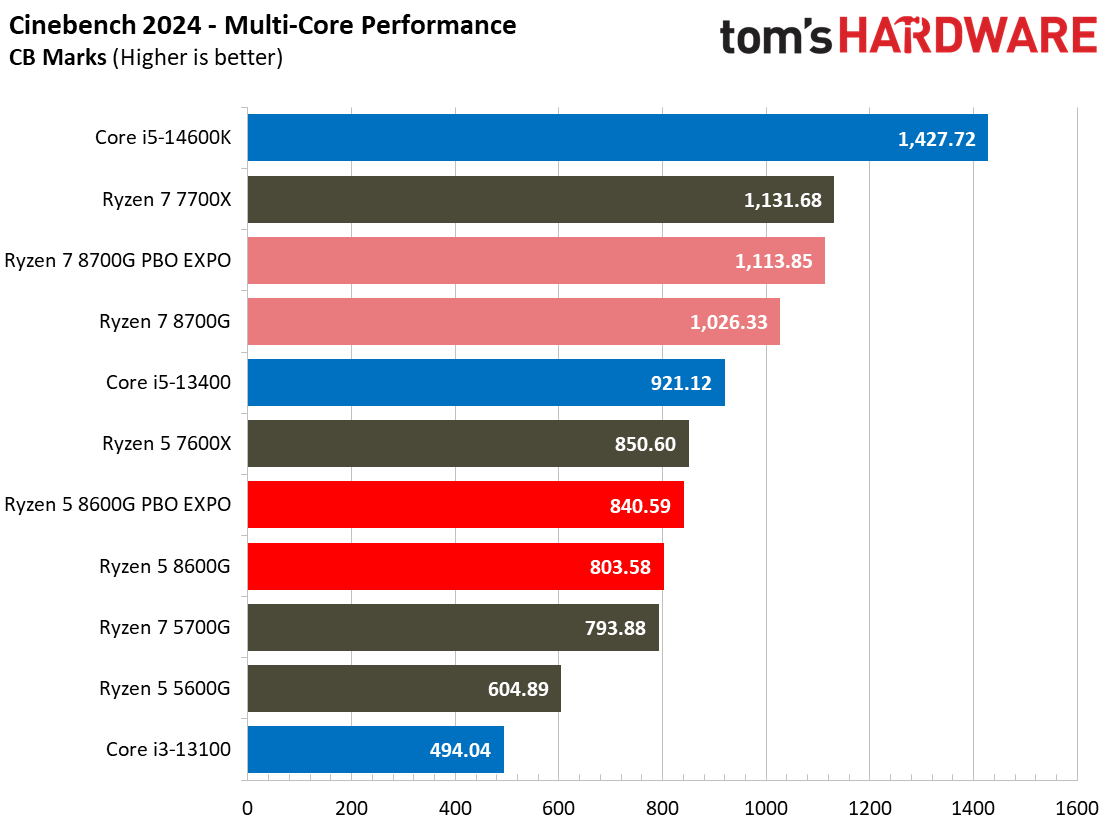
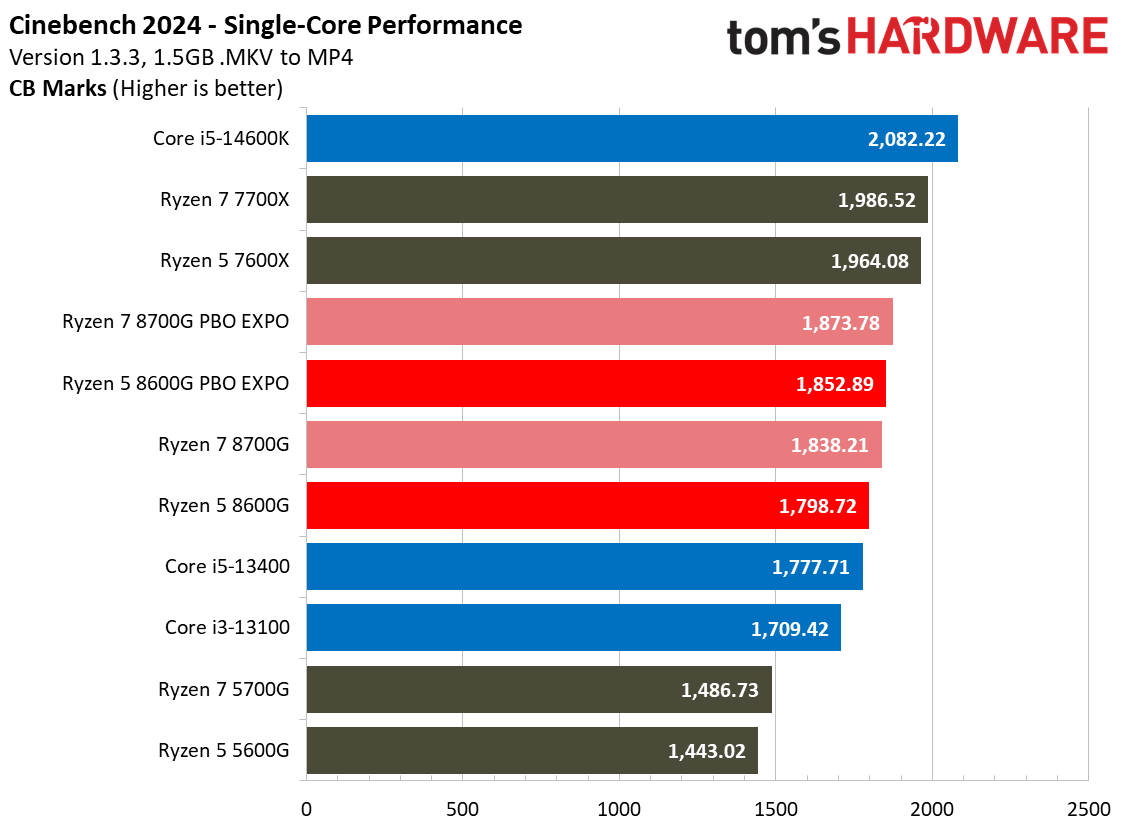

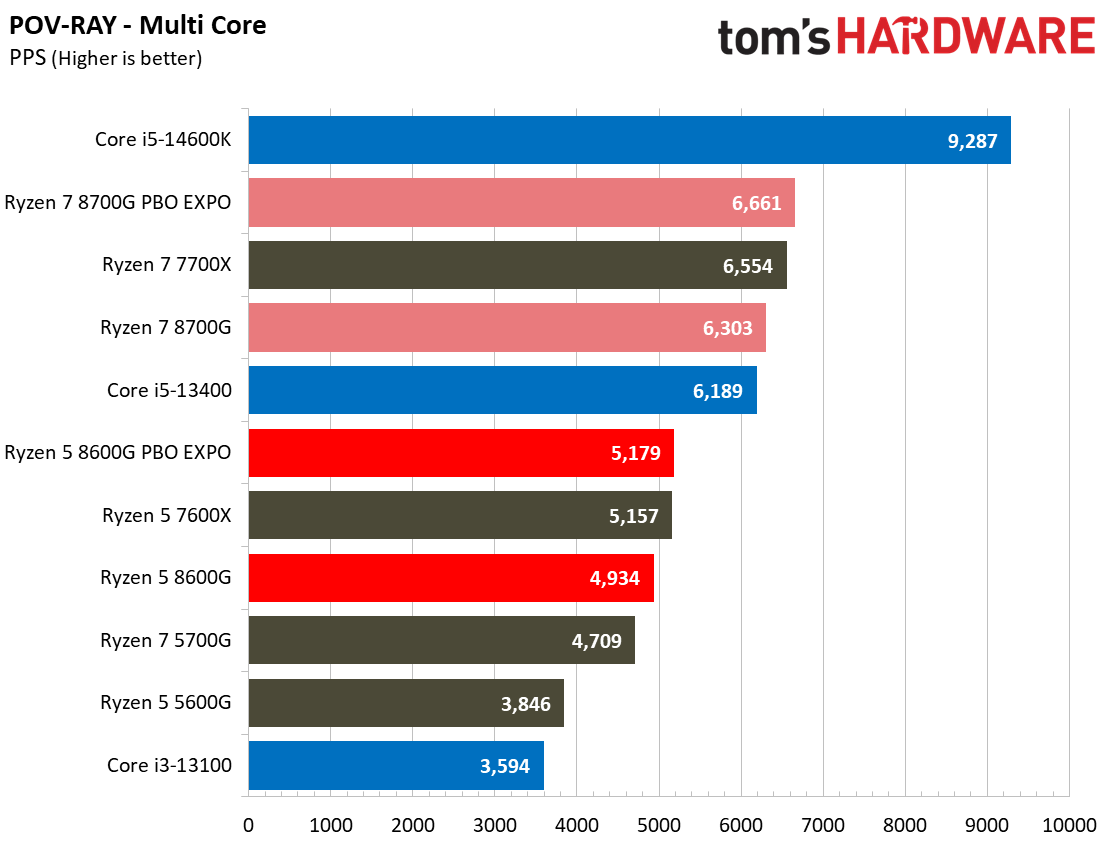
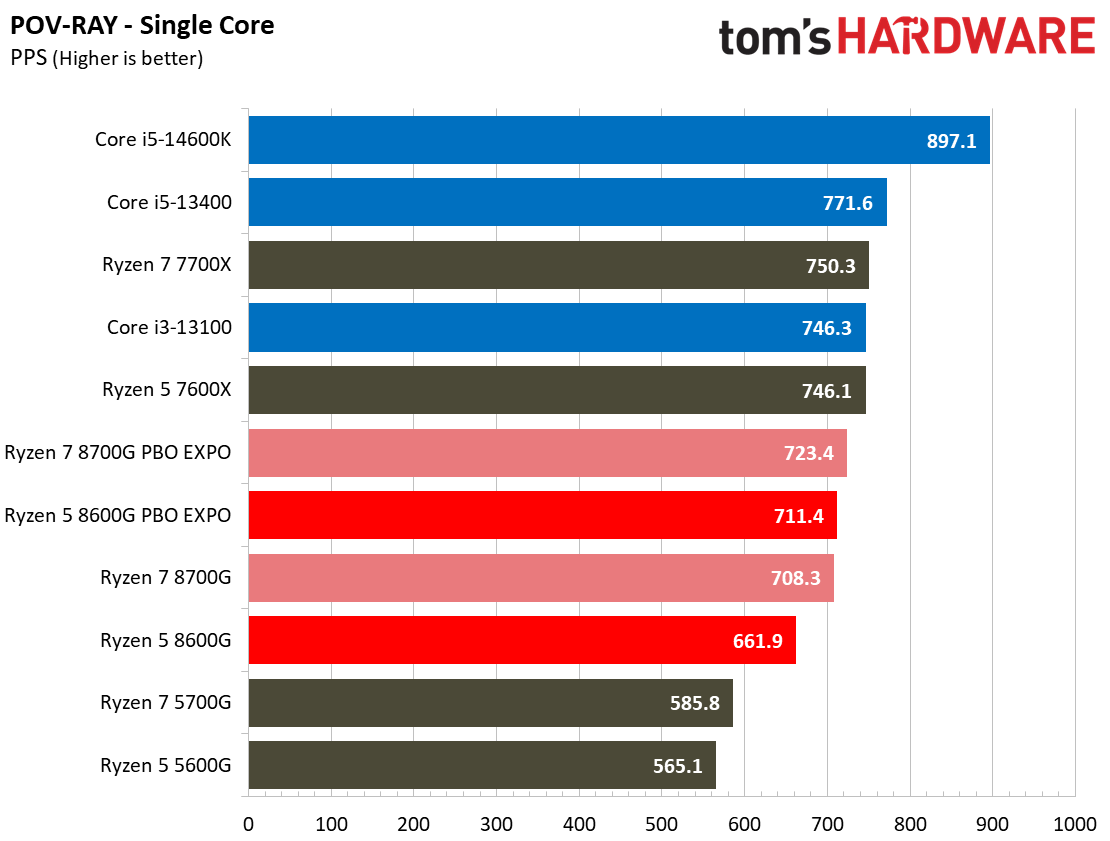
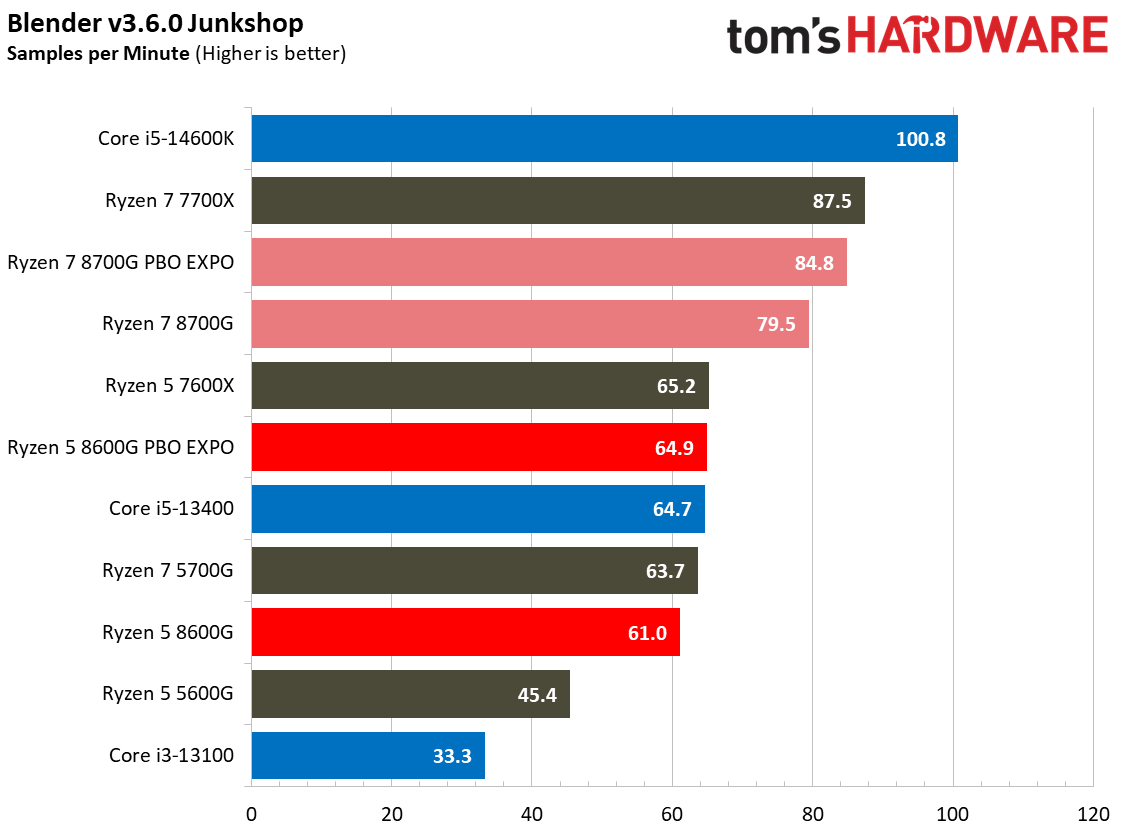
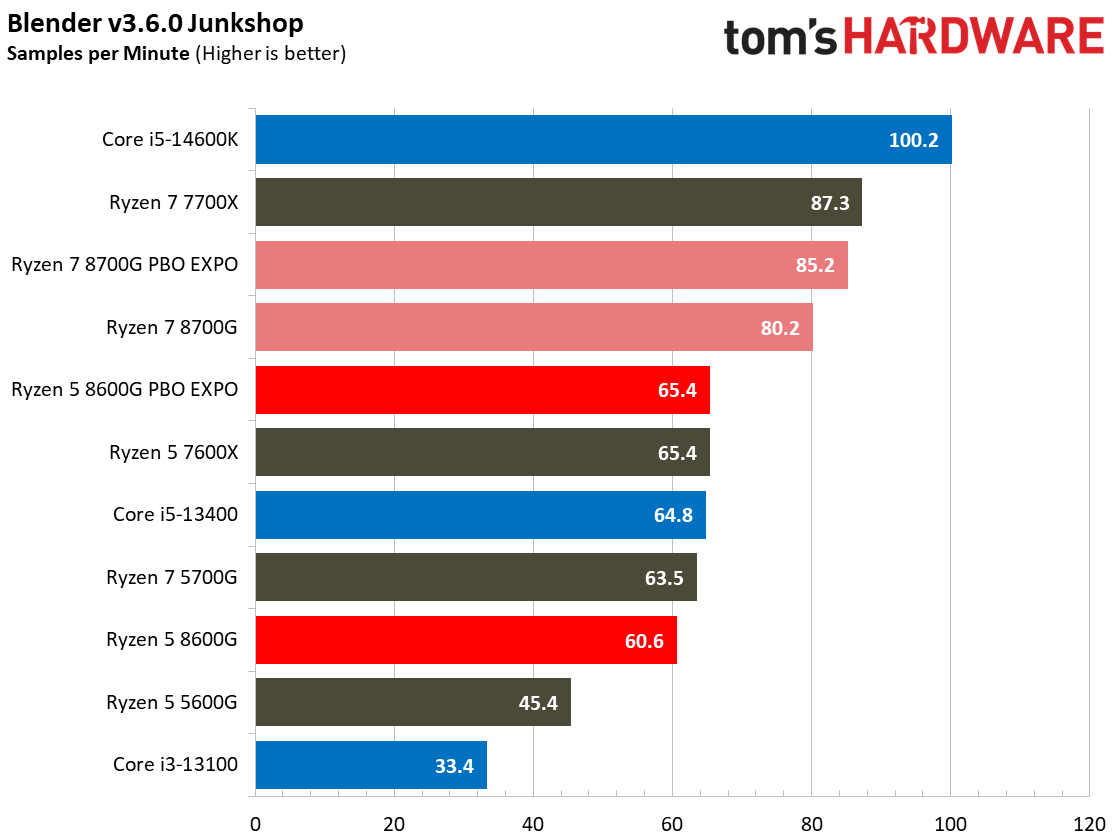
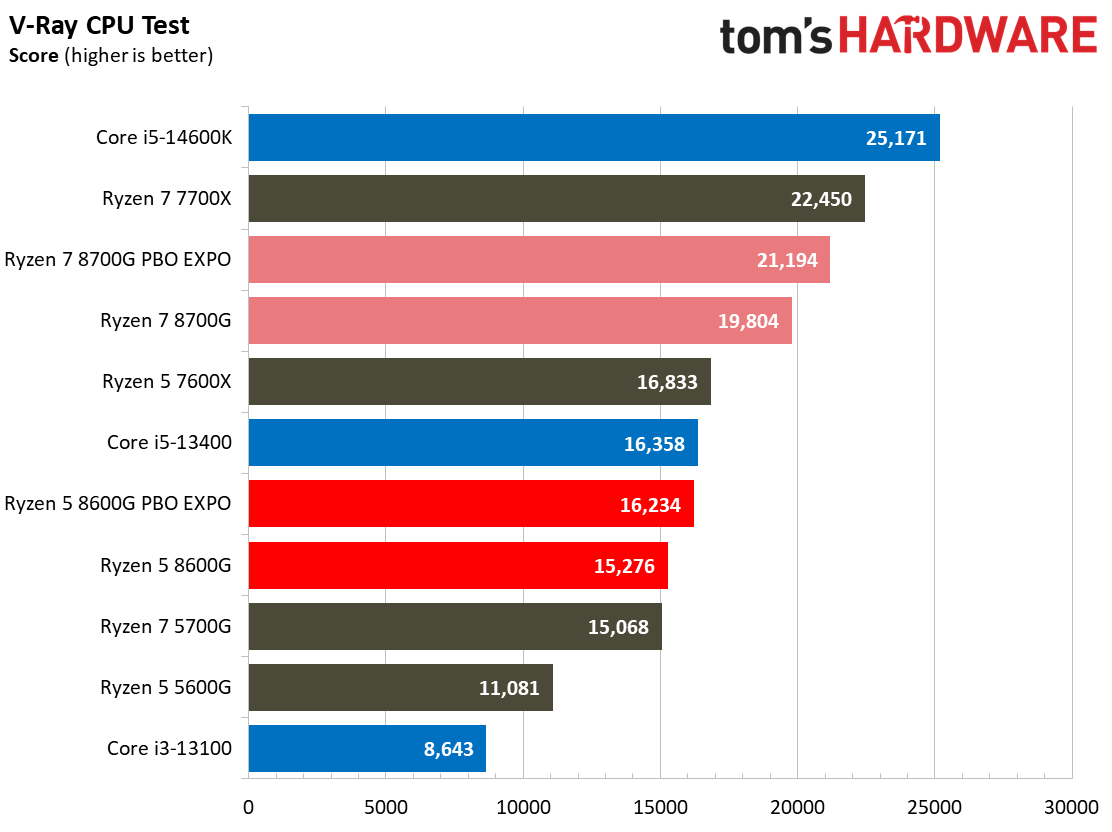
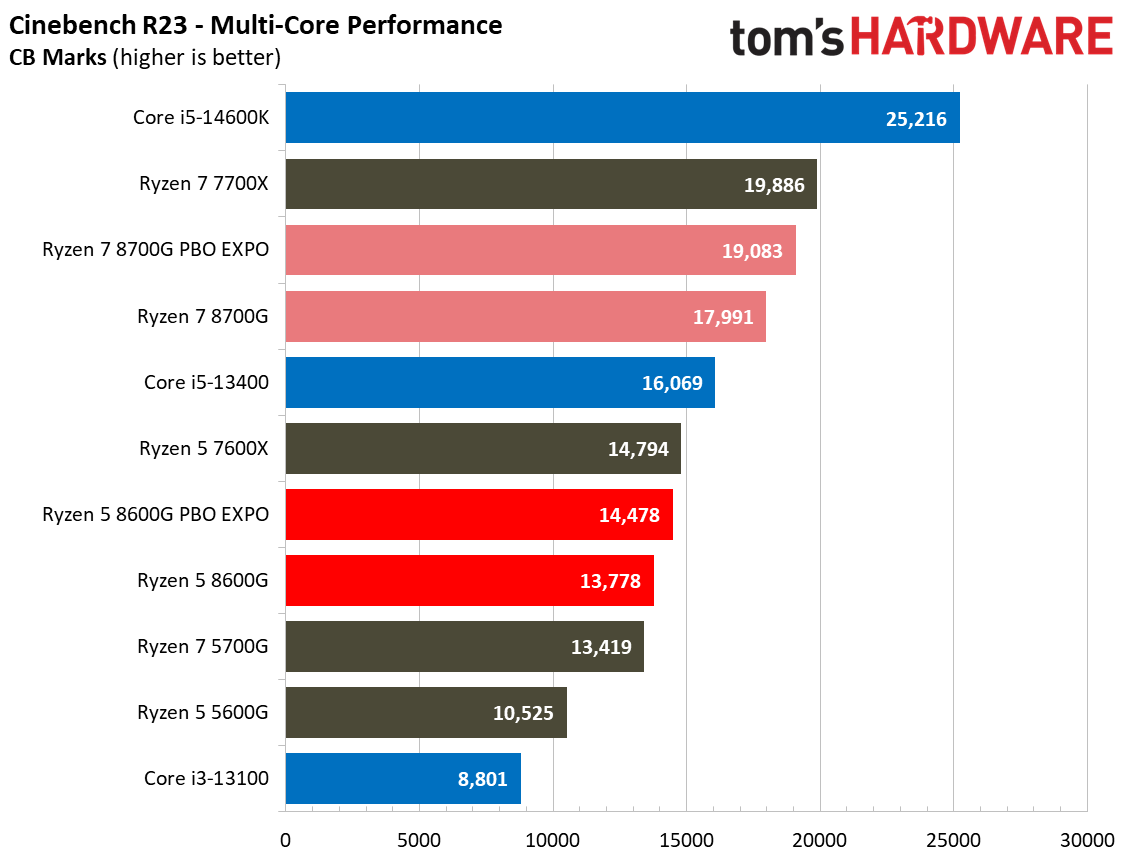
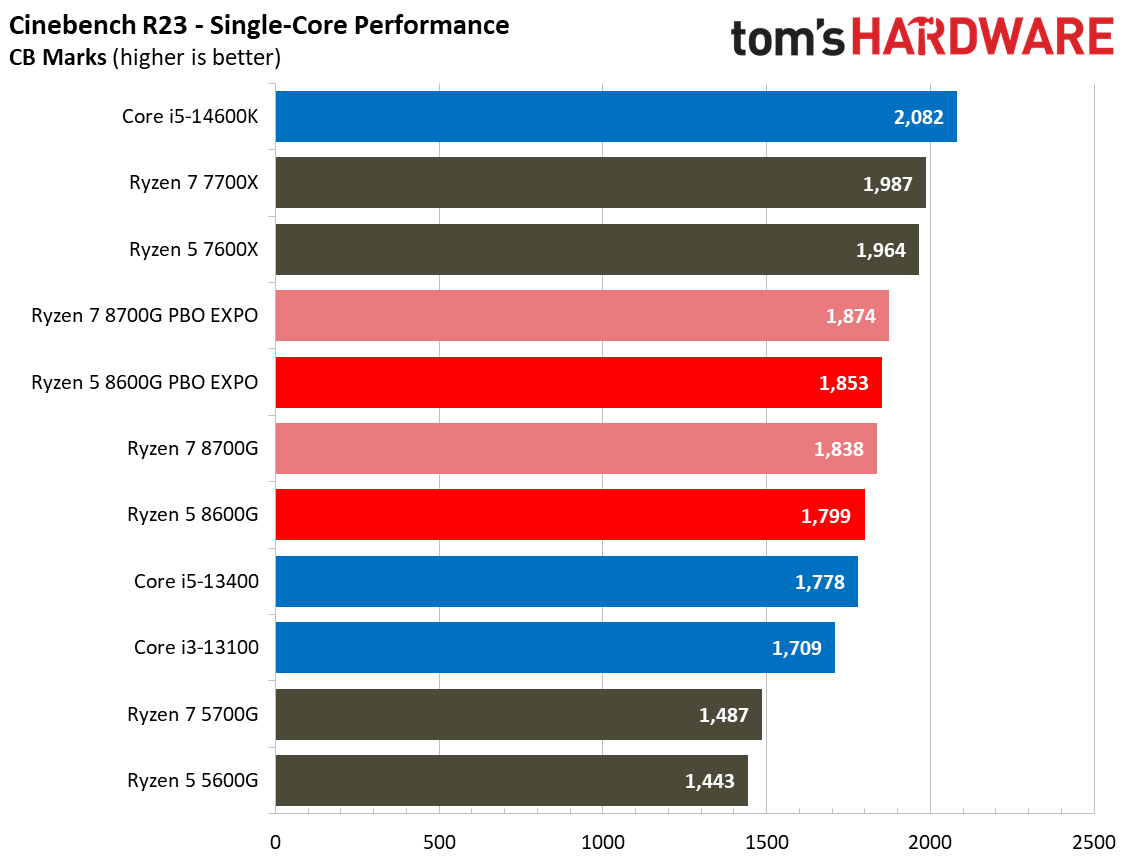
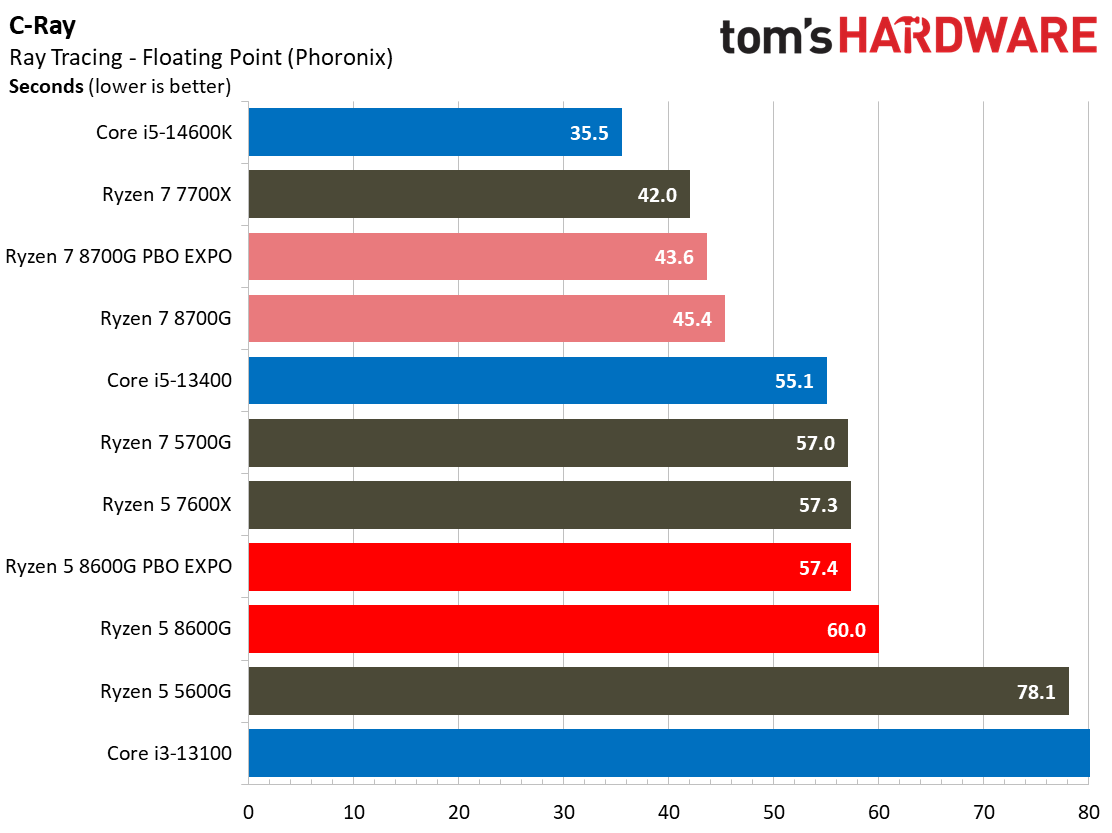
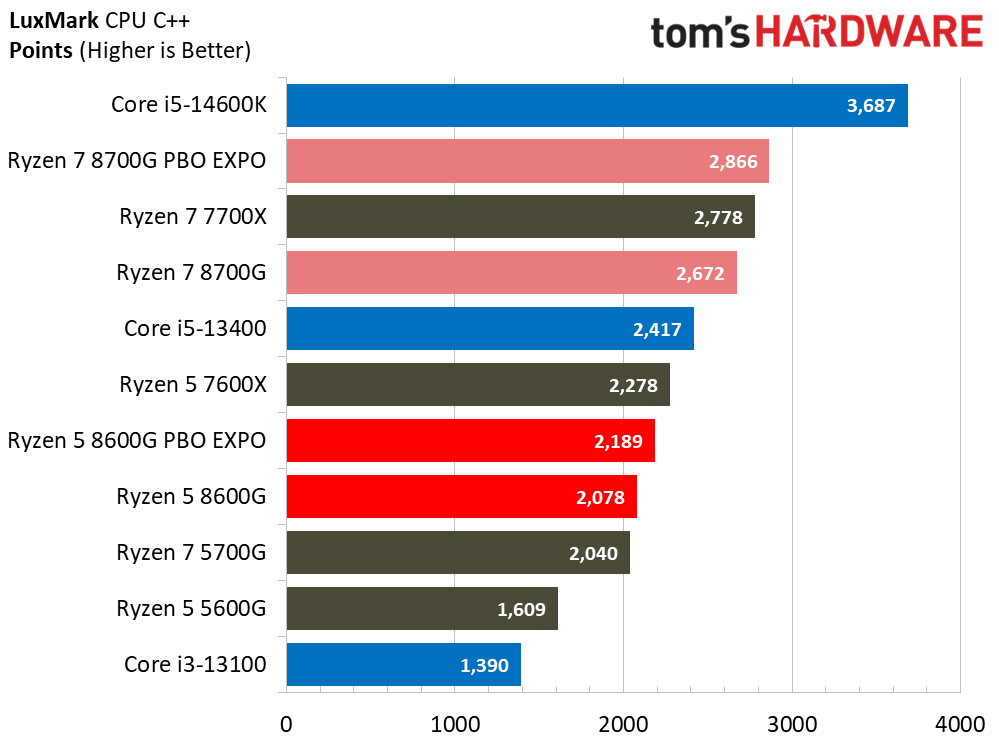
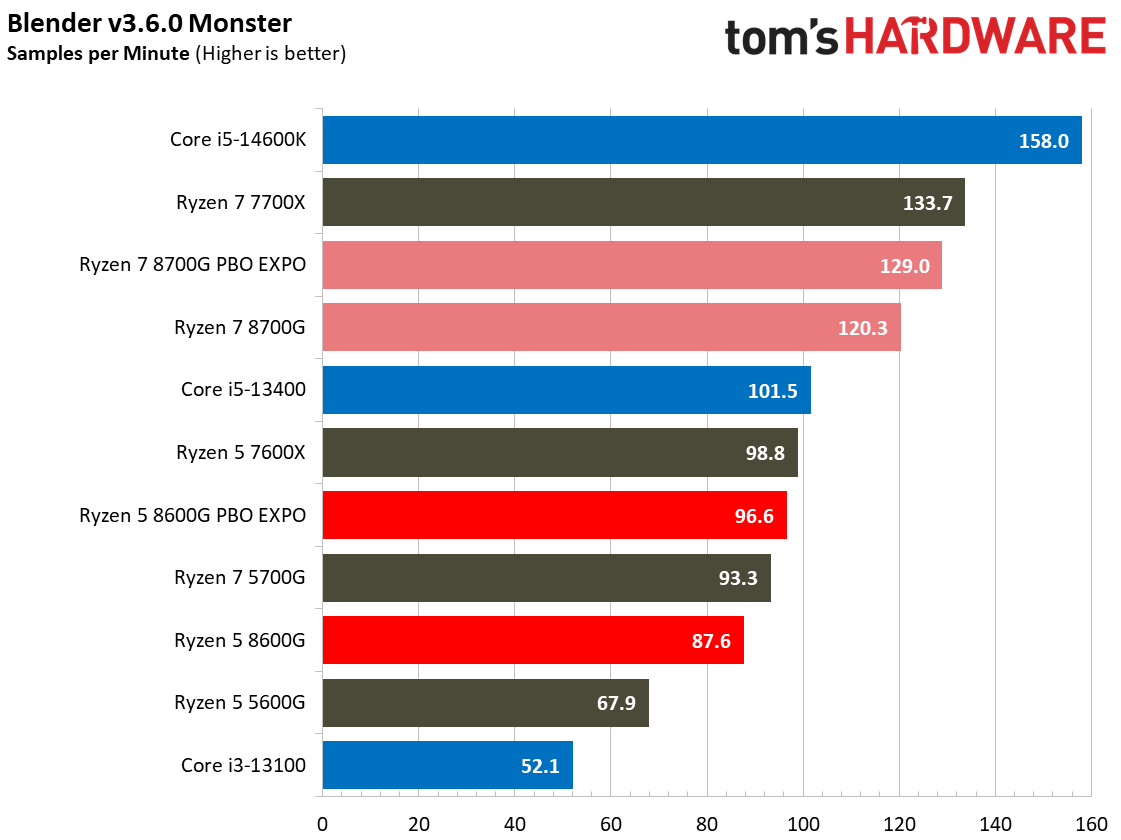
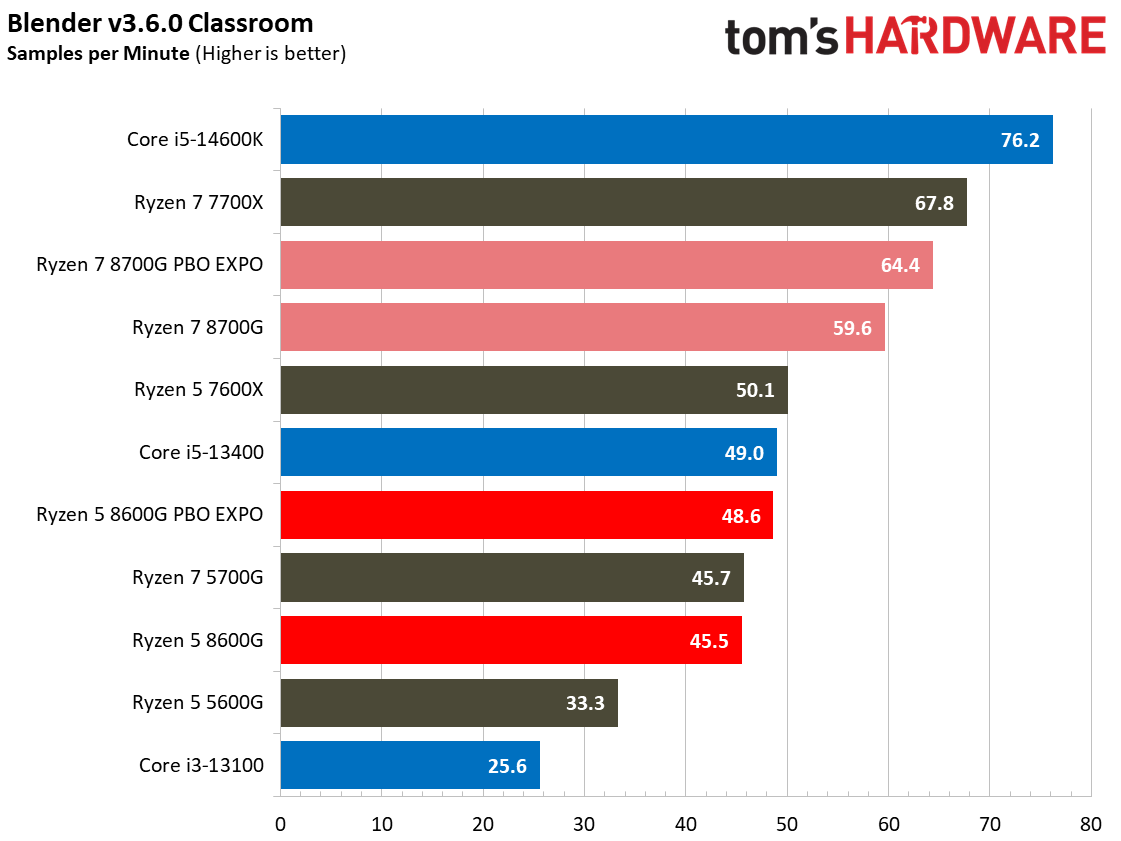
The Ryzen 5 8600G is 33% faster than the previous-gen 5600G in the Cinebench 2024 multi-core test and 25% faster in single-threaded performance, giving us a good litmus for what to expect in this album of compute-heavy benchmarks.
Naturally, unlocking the power limits with overclocking yields a bit more horsepower in threaded workloads, but you shouldn't expect too much from an APU in heavy rendering workloads — these chips are designed to excel in gaming over productivity applications.
Encoding Benchmarks on AMD Ryzen 5 8600G
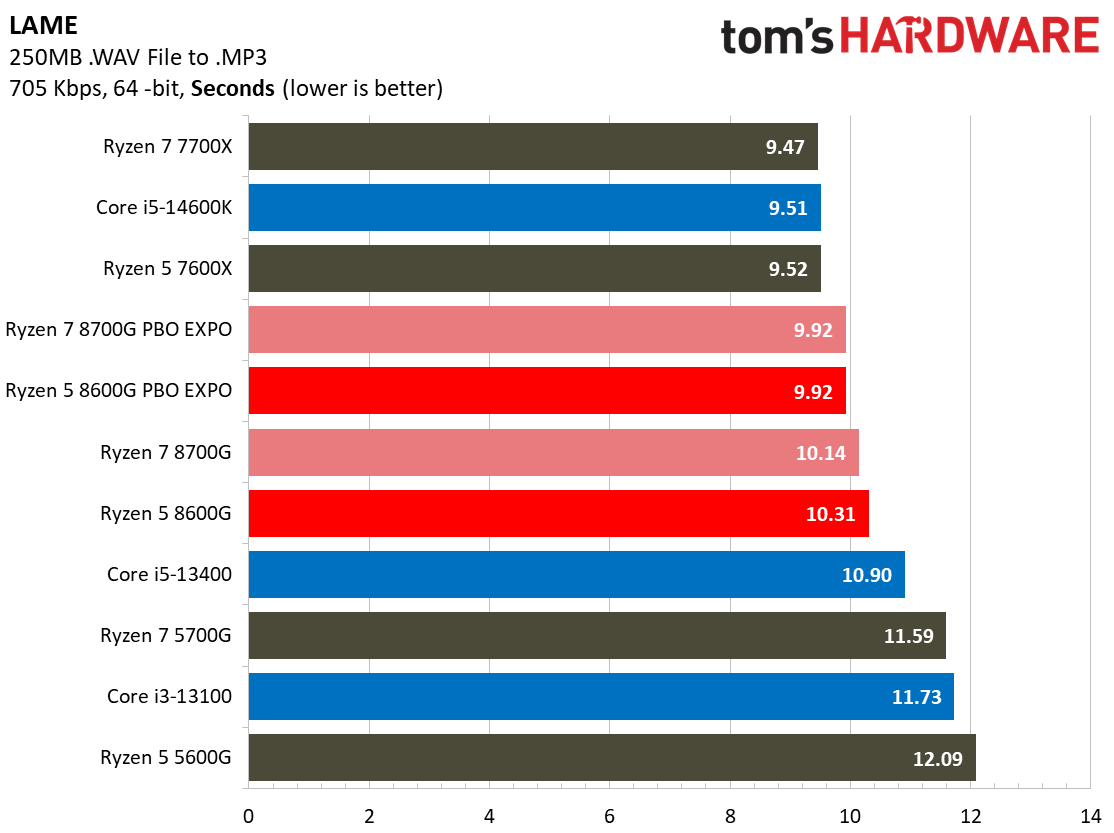
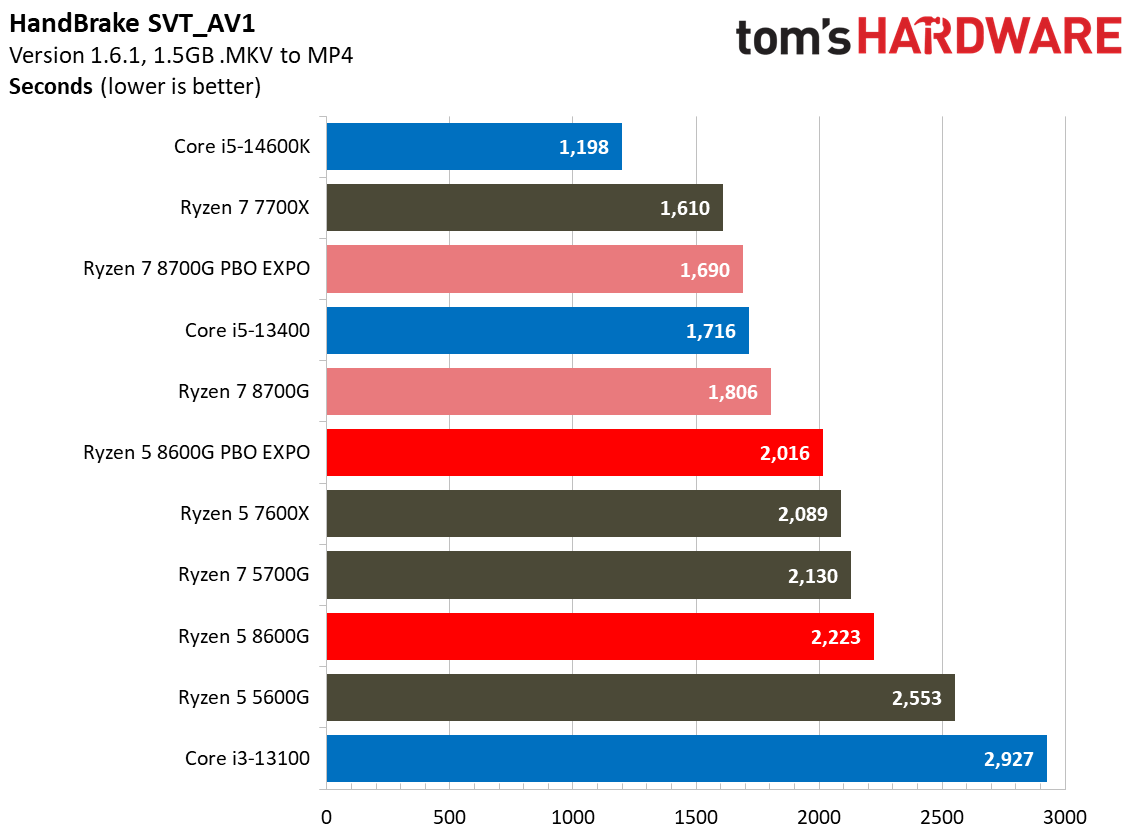
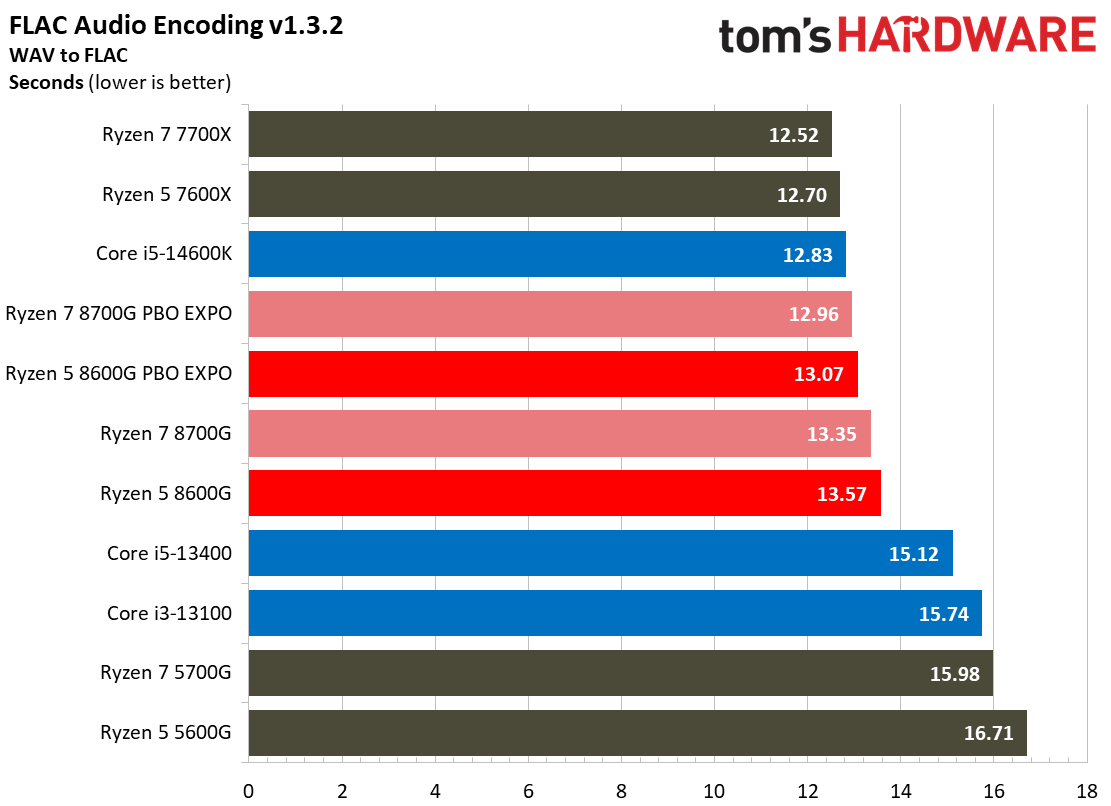
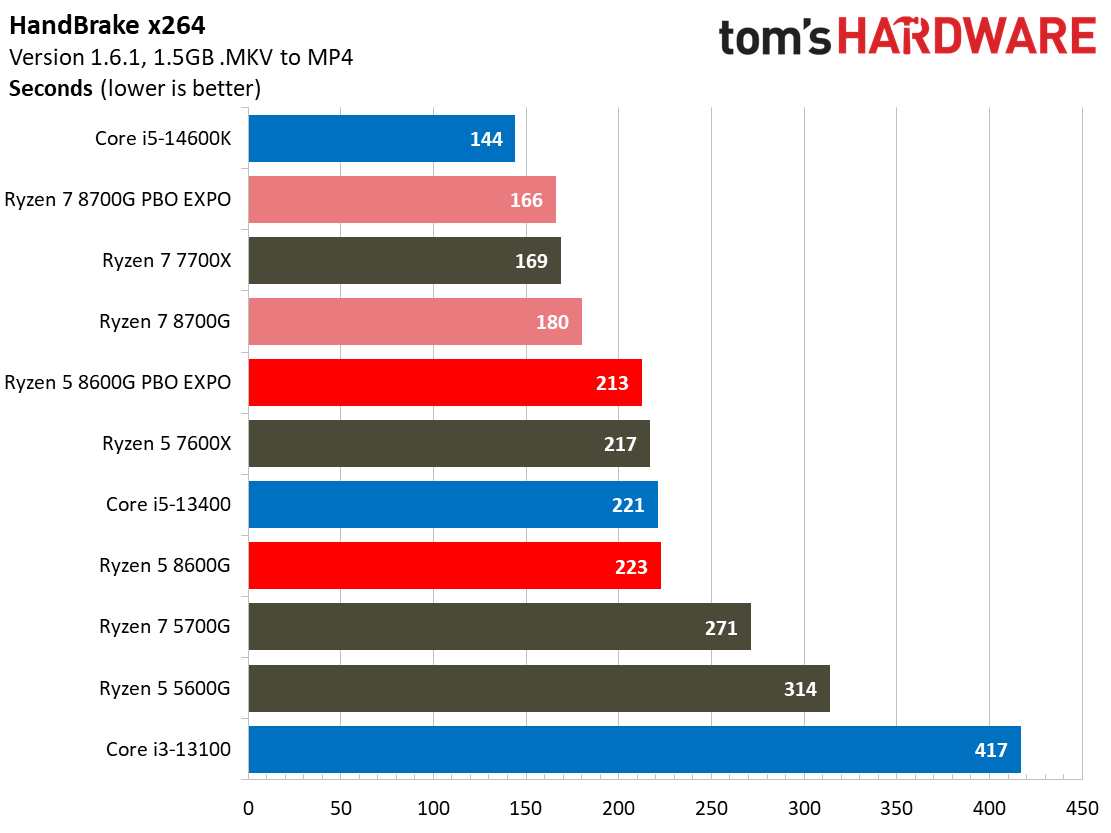
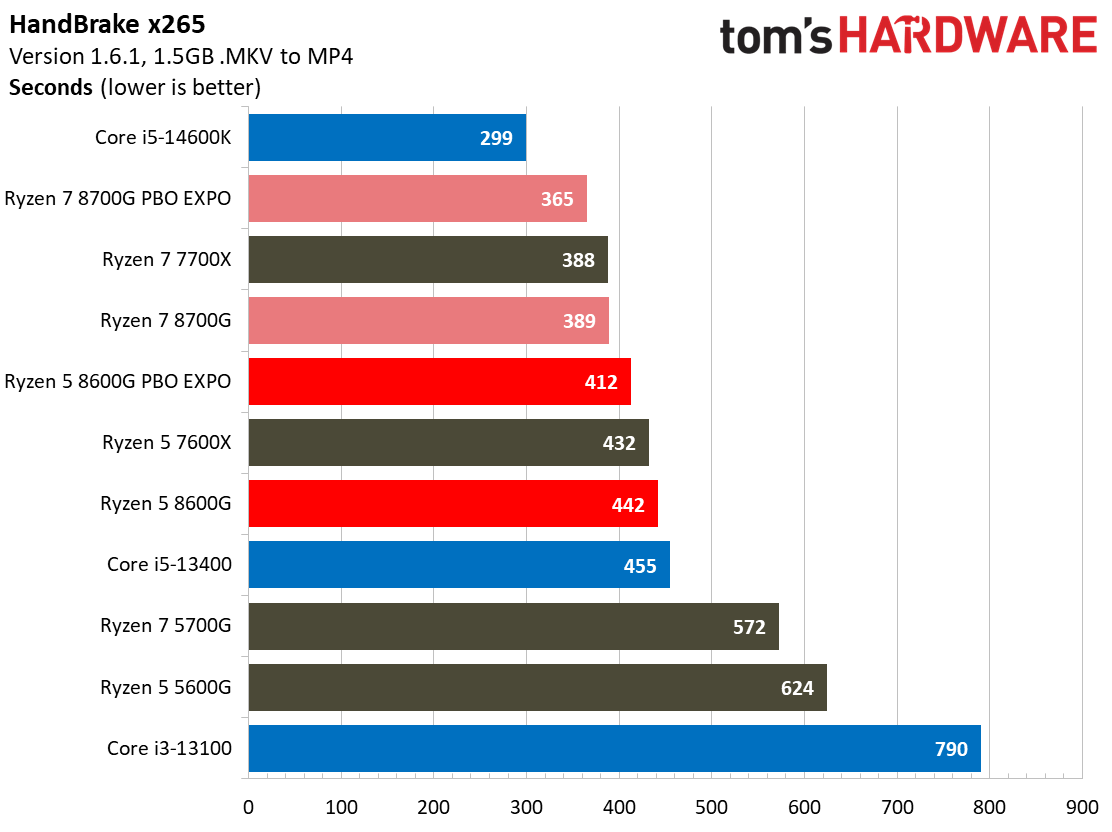
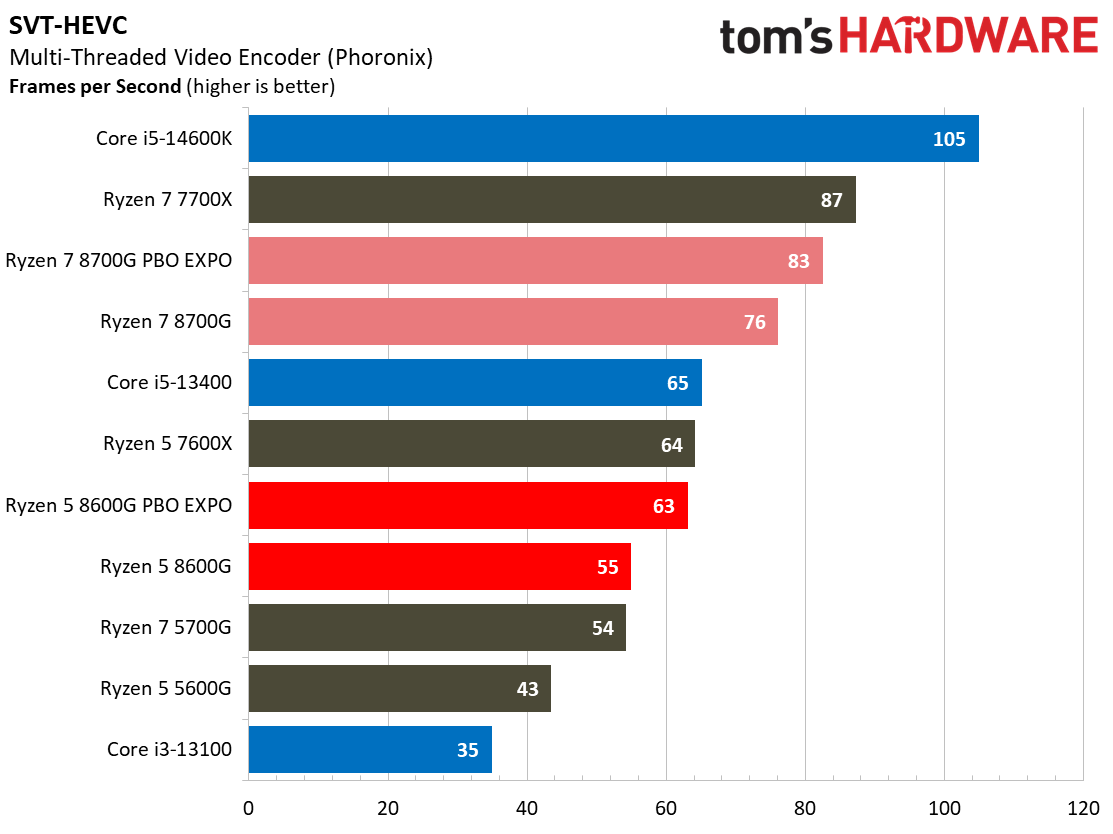
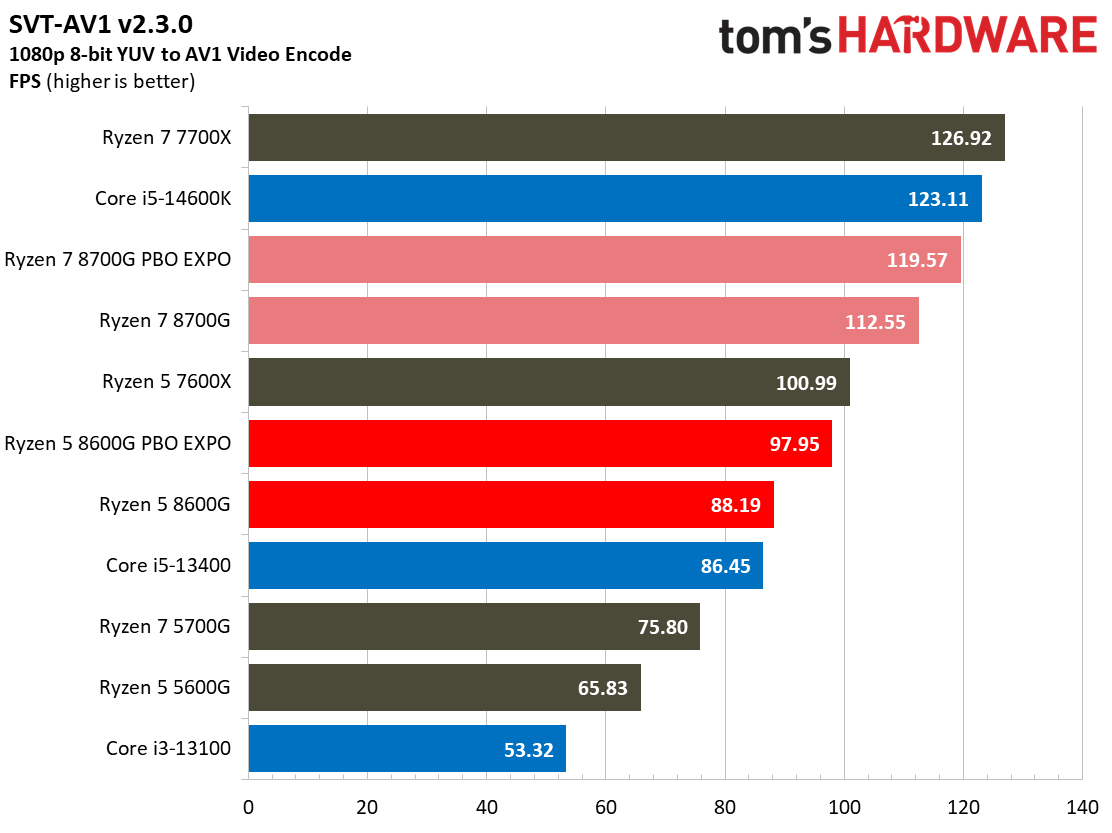
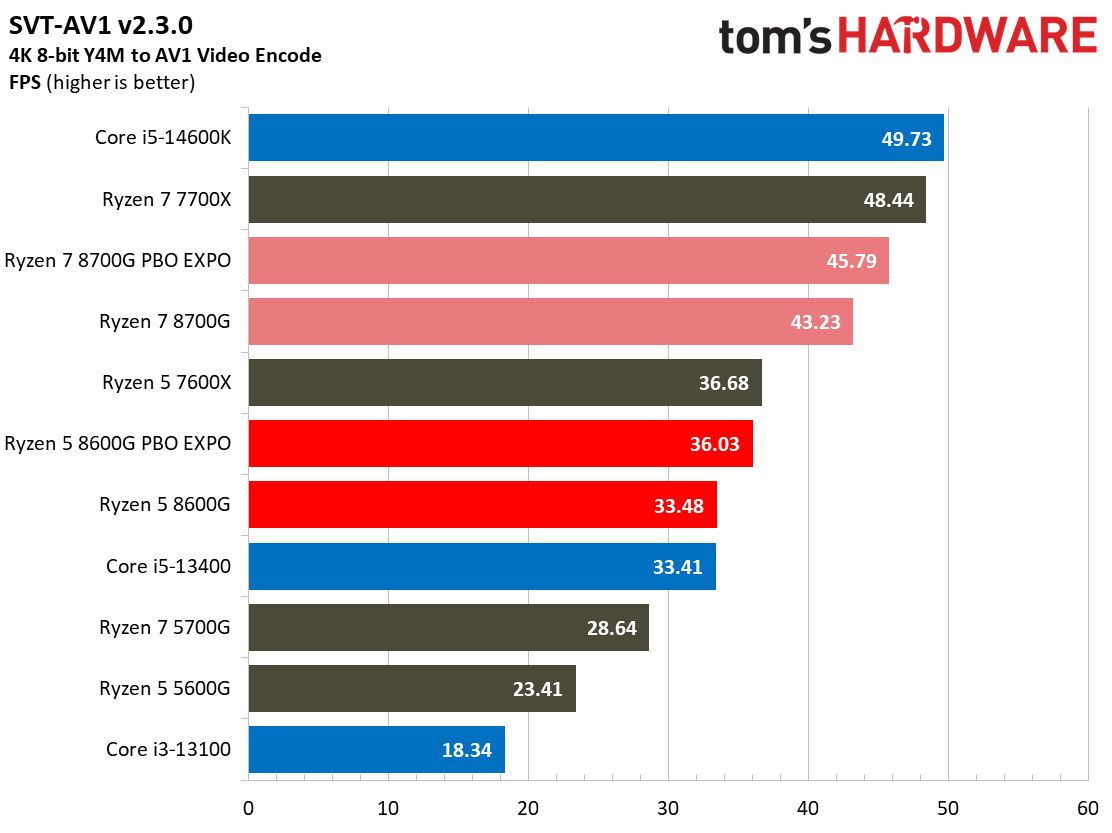
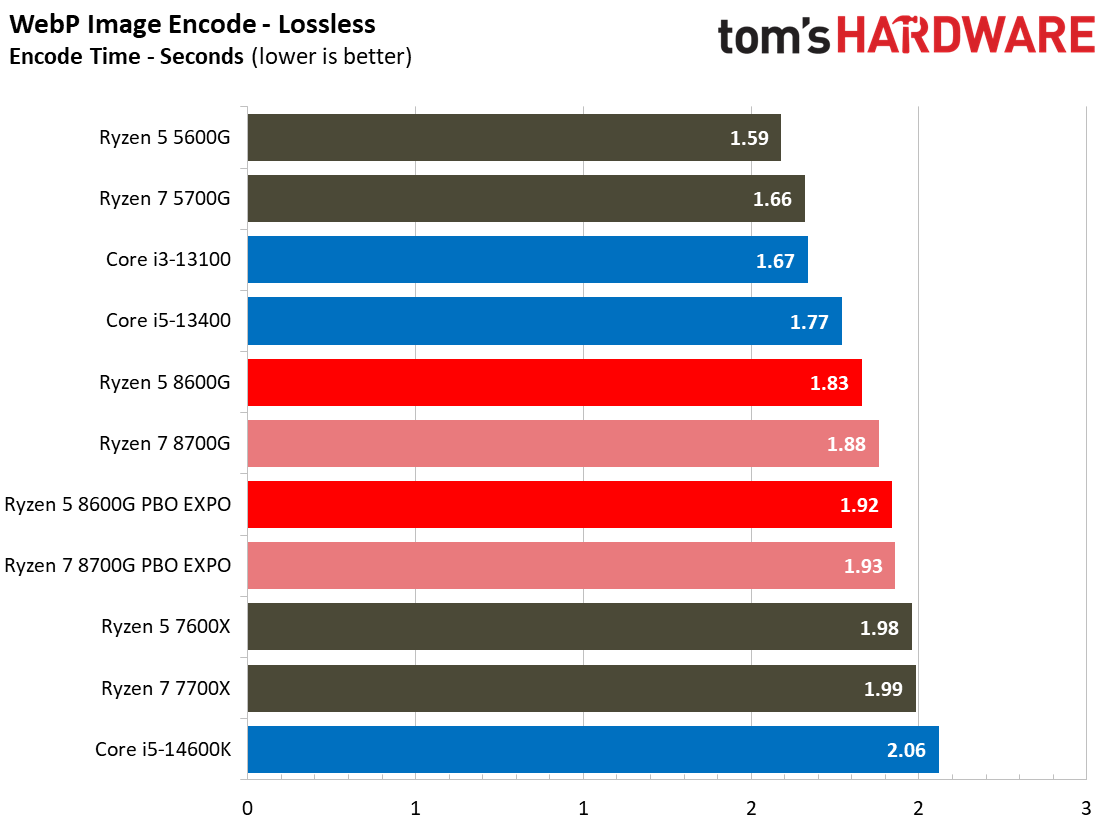
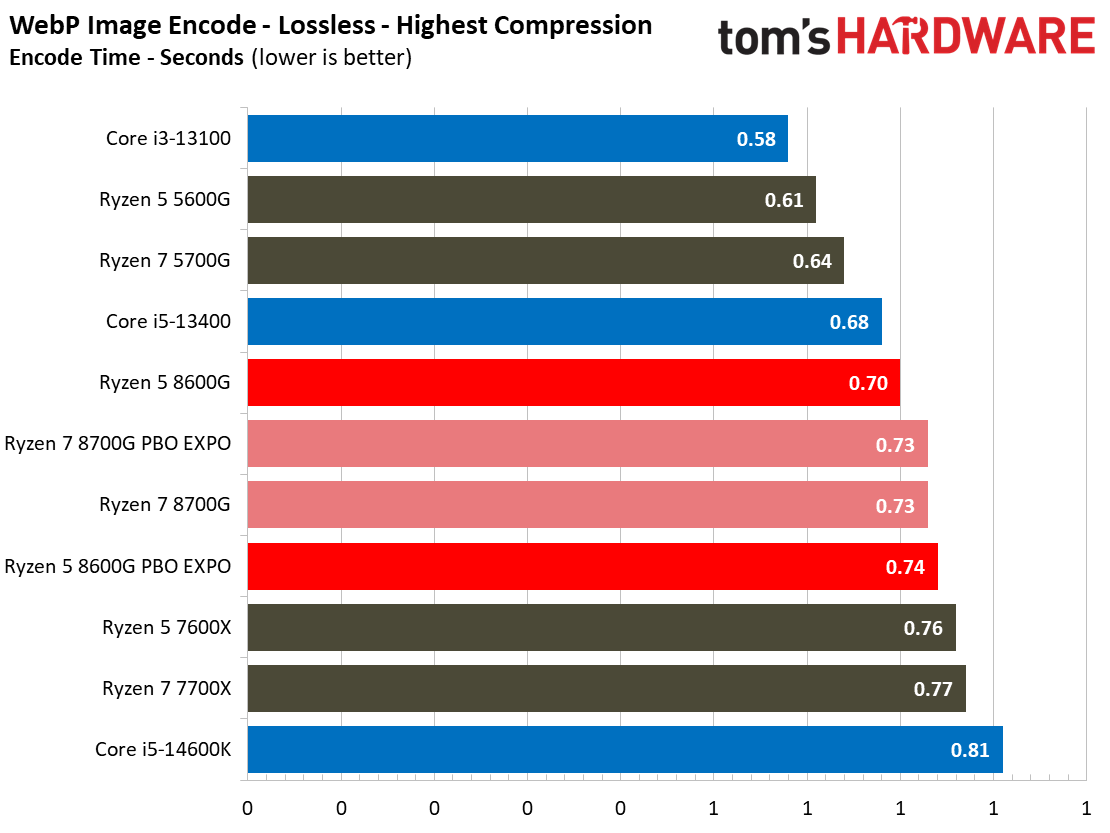
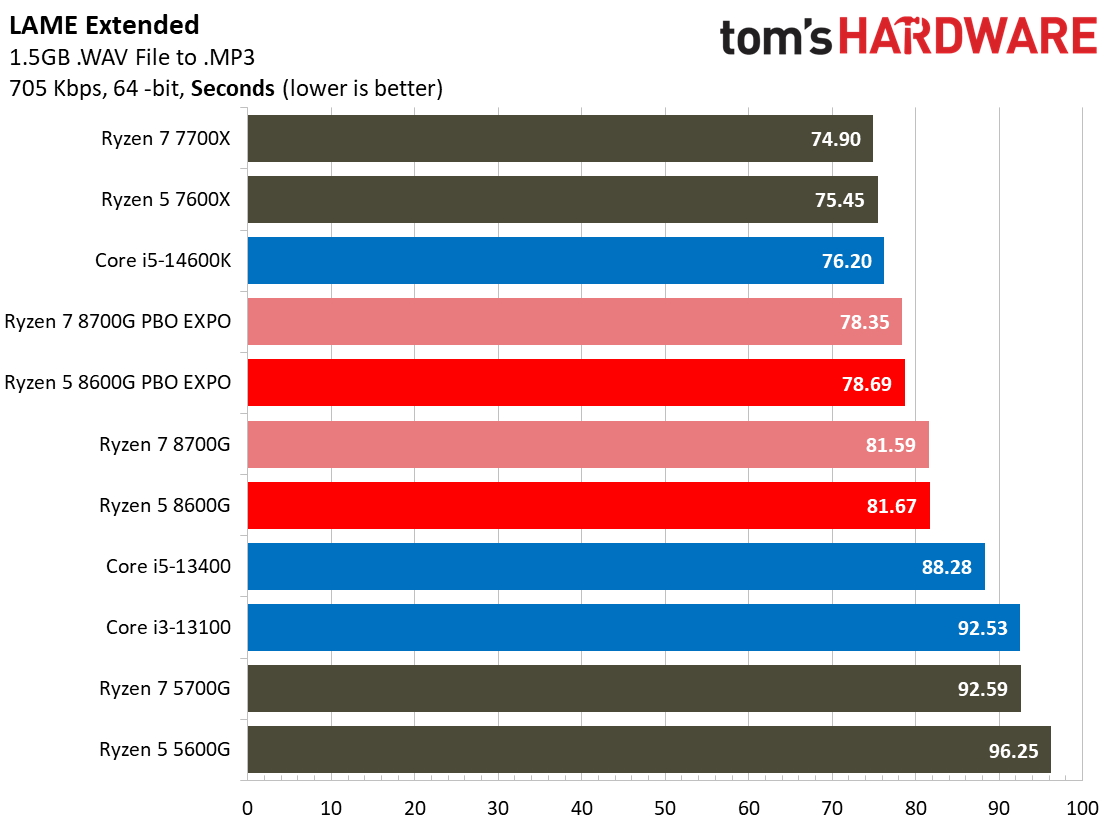
Our tests include single-threaded encoding benchmarks, like LAME and FLAC, but the SVT-AV1 and SVT-HEVC tests represent a newer class of threaded encoders.
Web and Office Benchmarks on AMD Ryzen 5 8600G
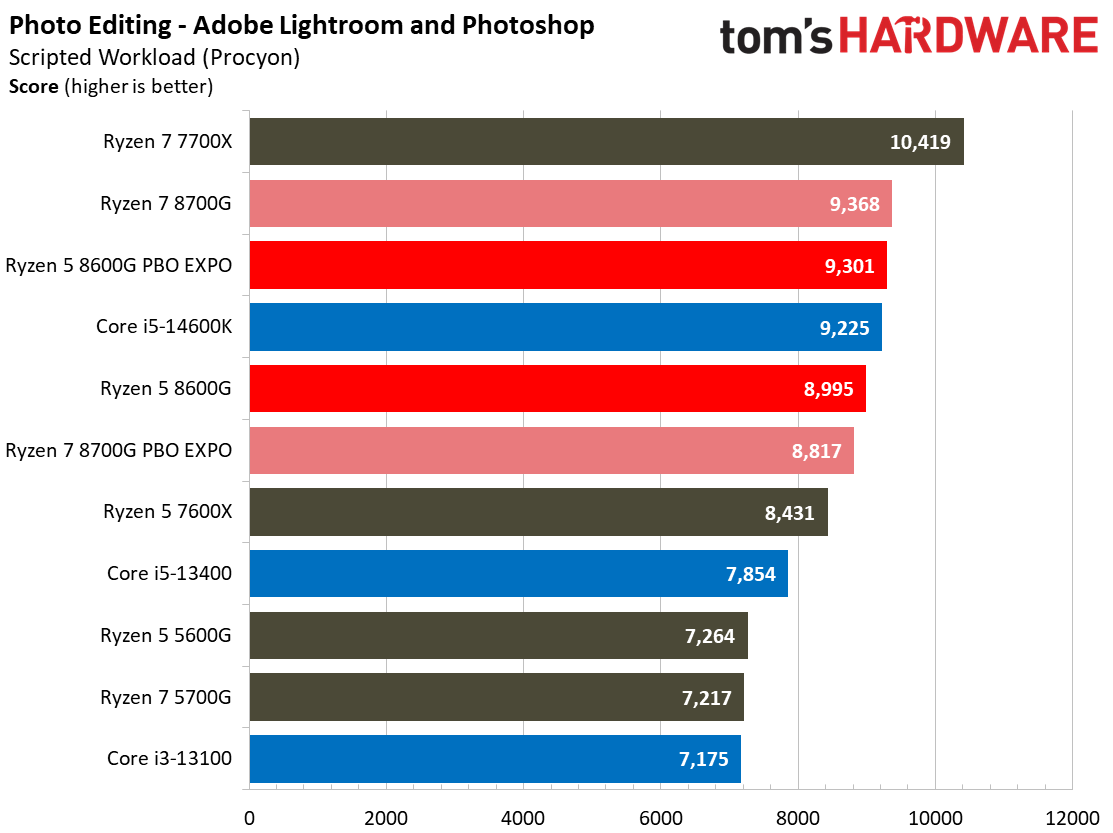
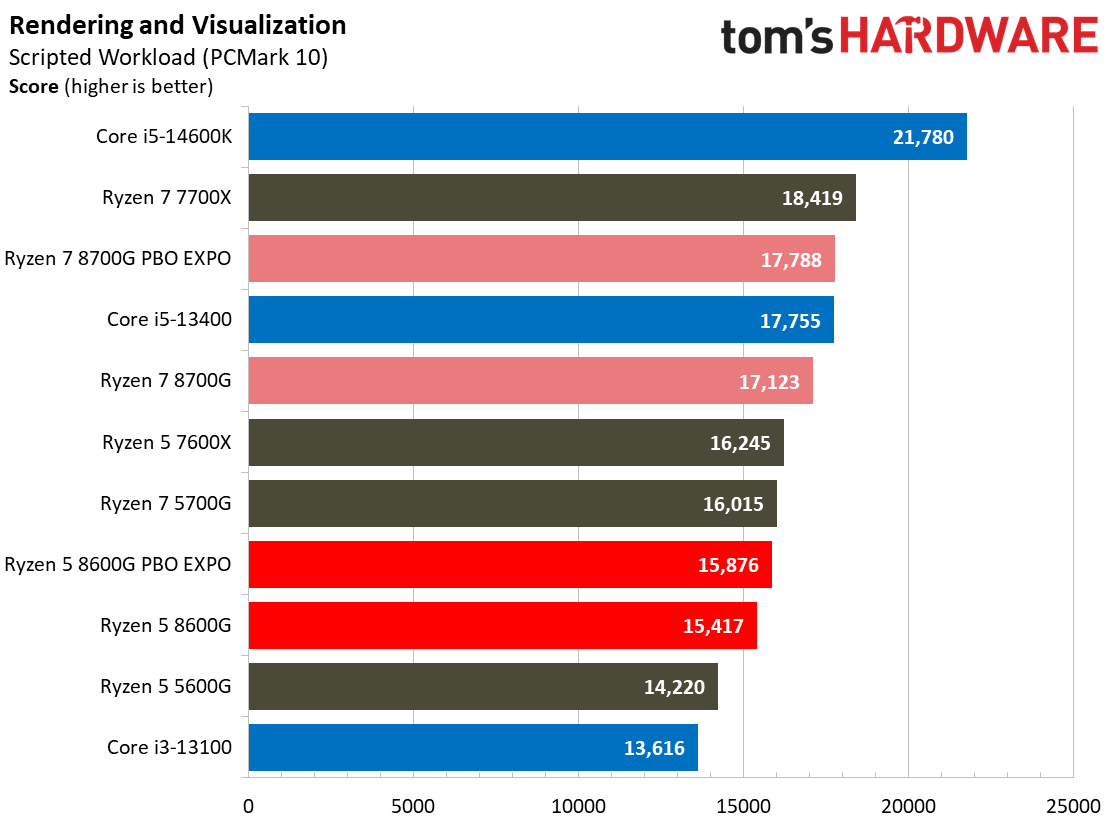
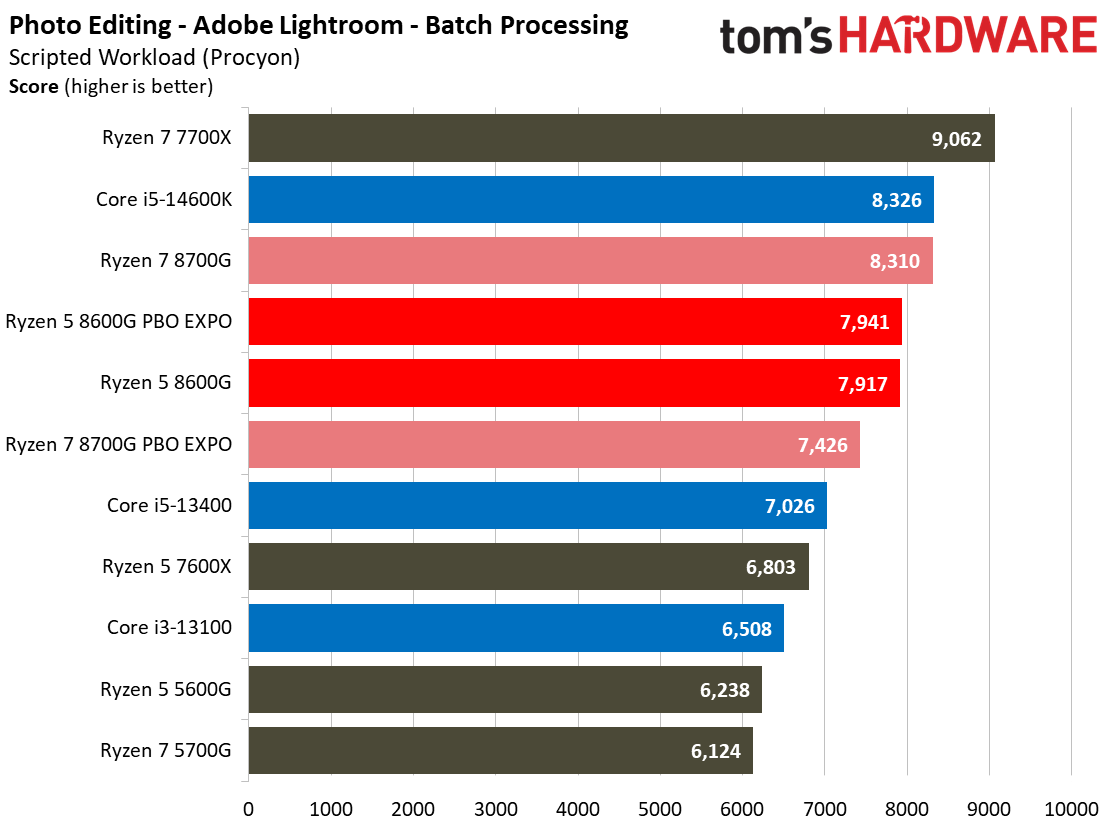
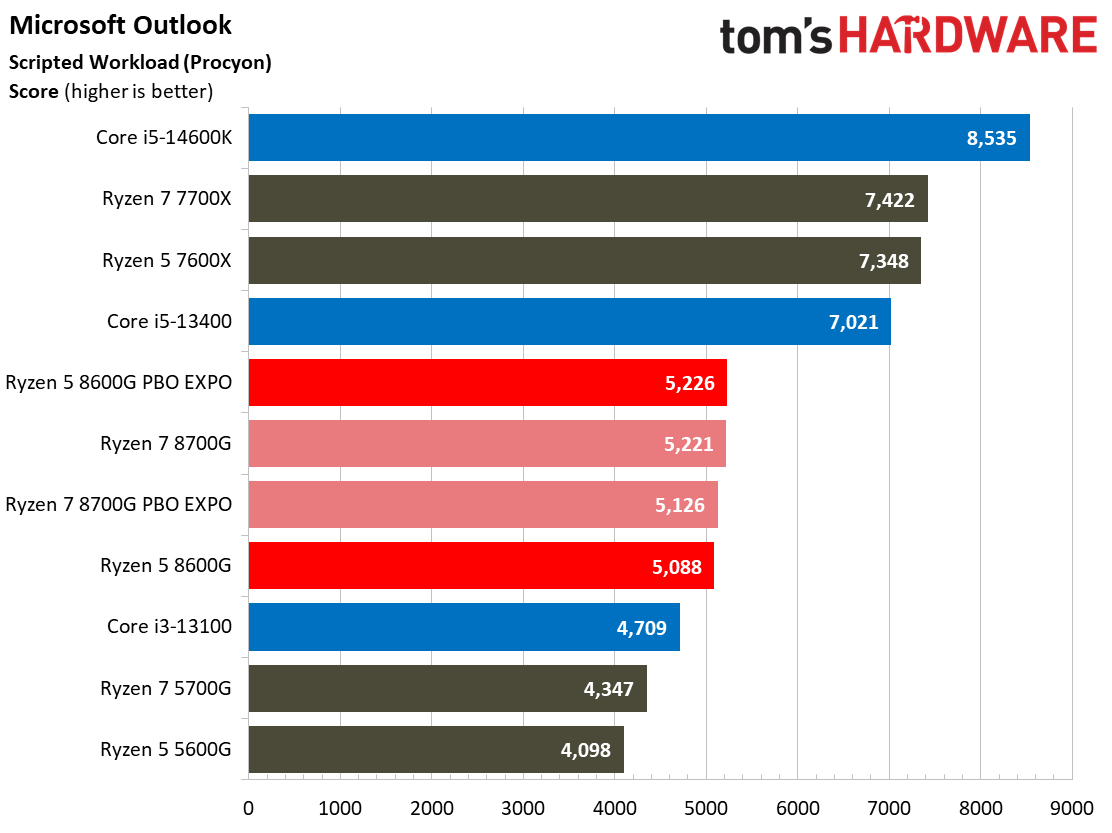
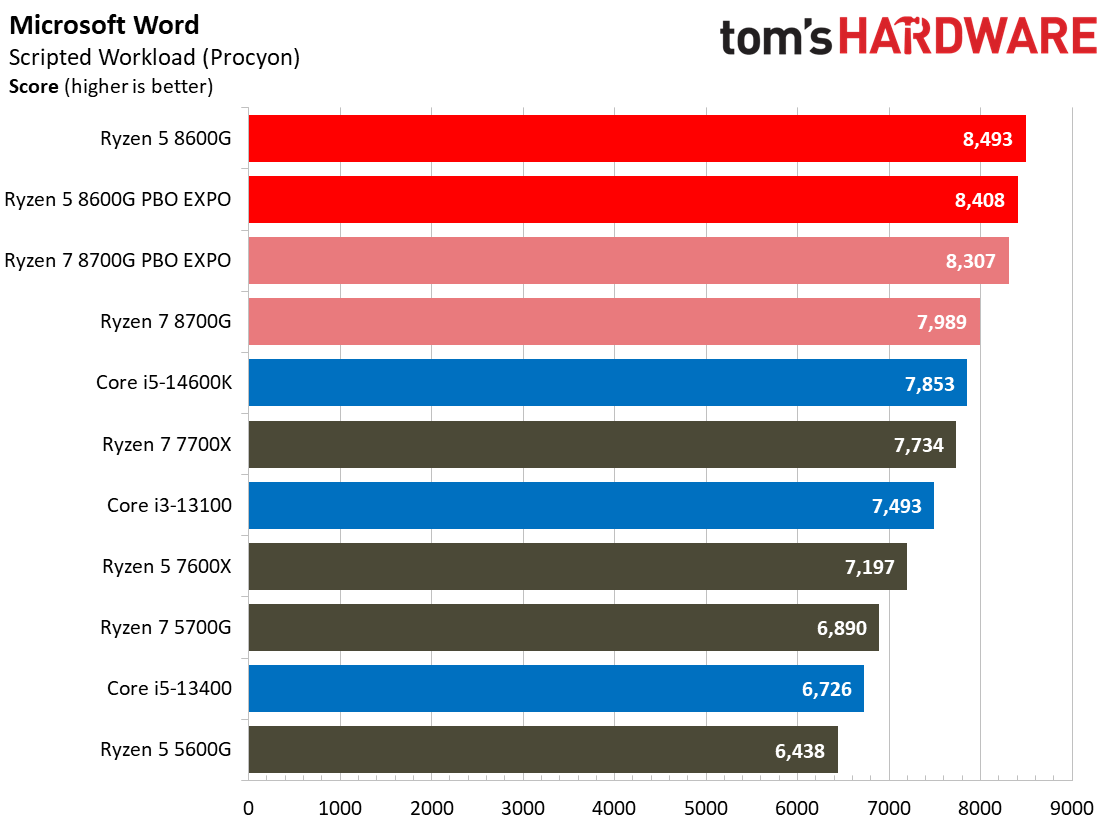
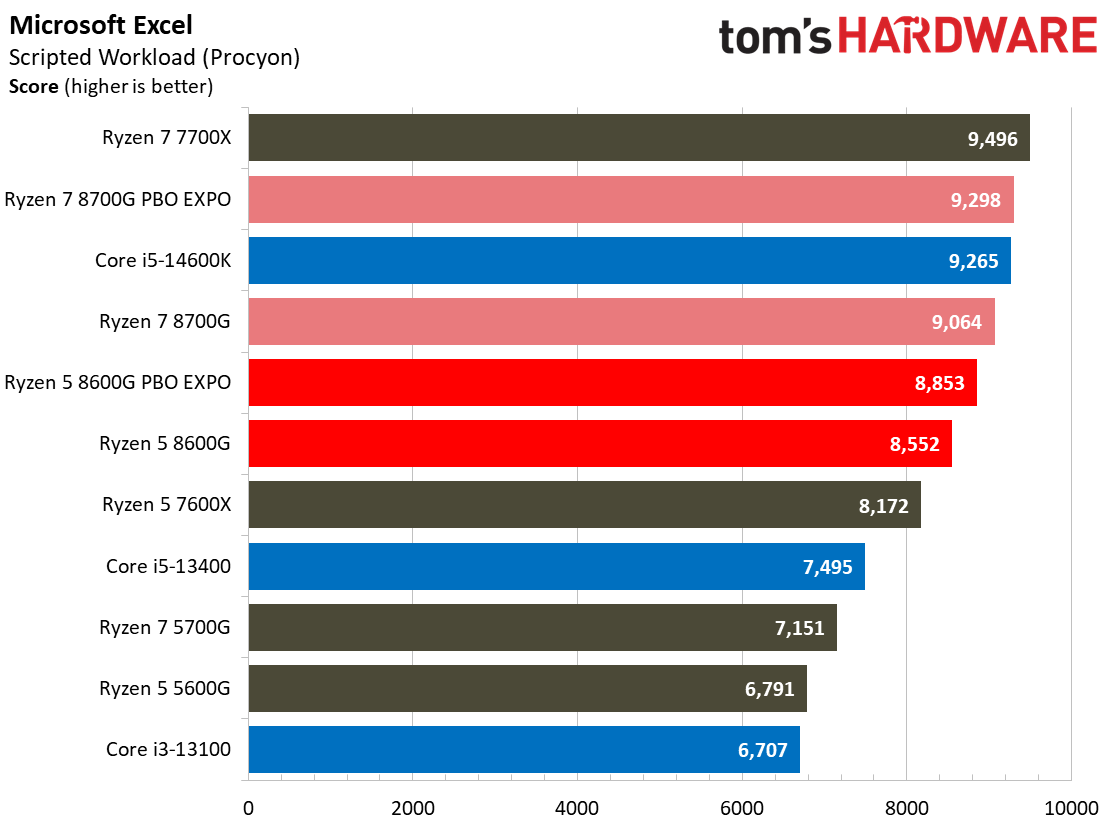
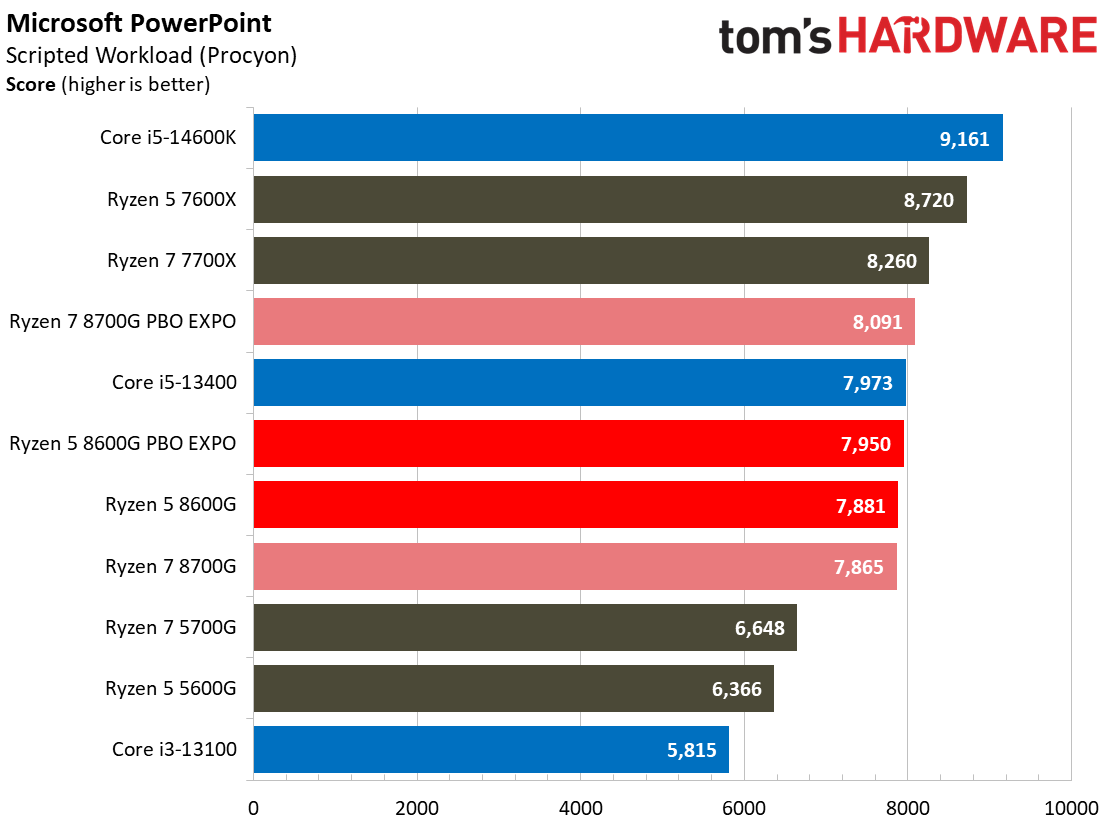
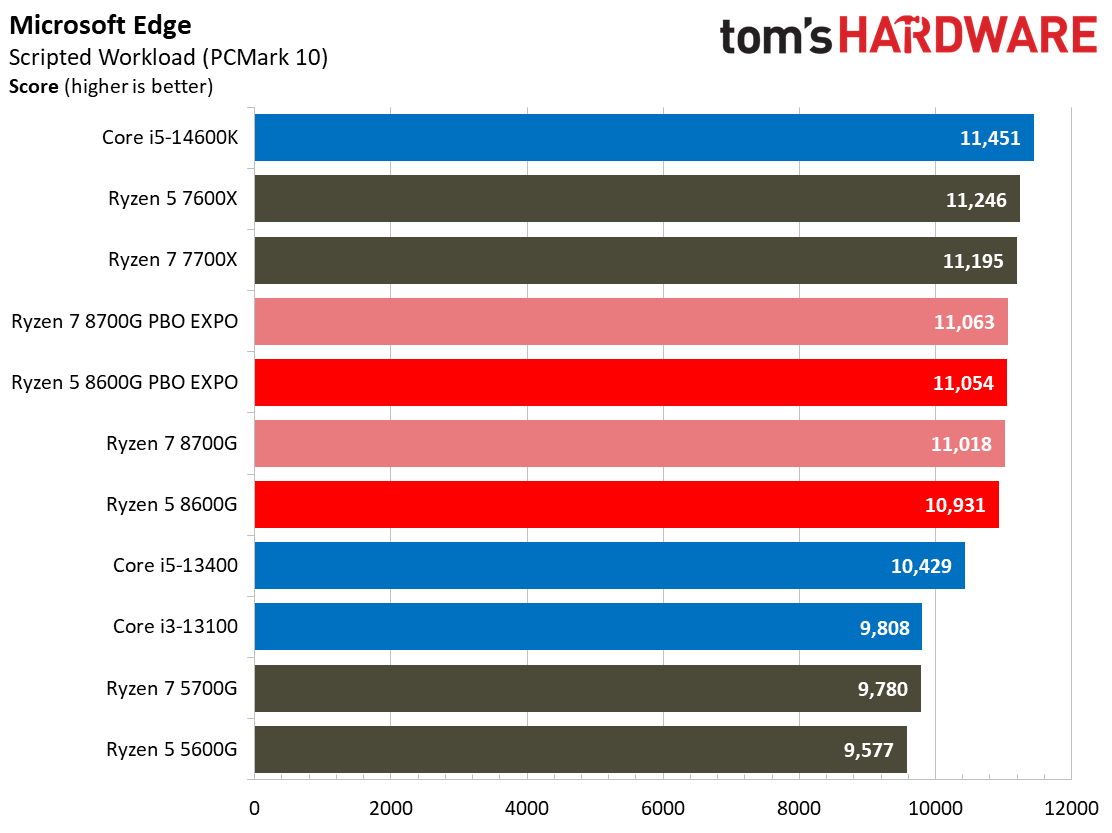
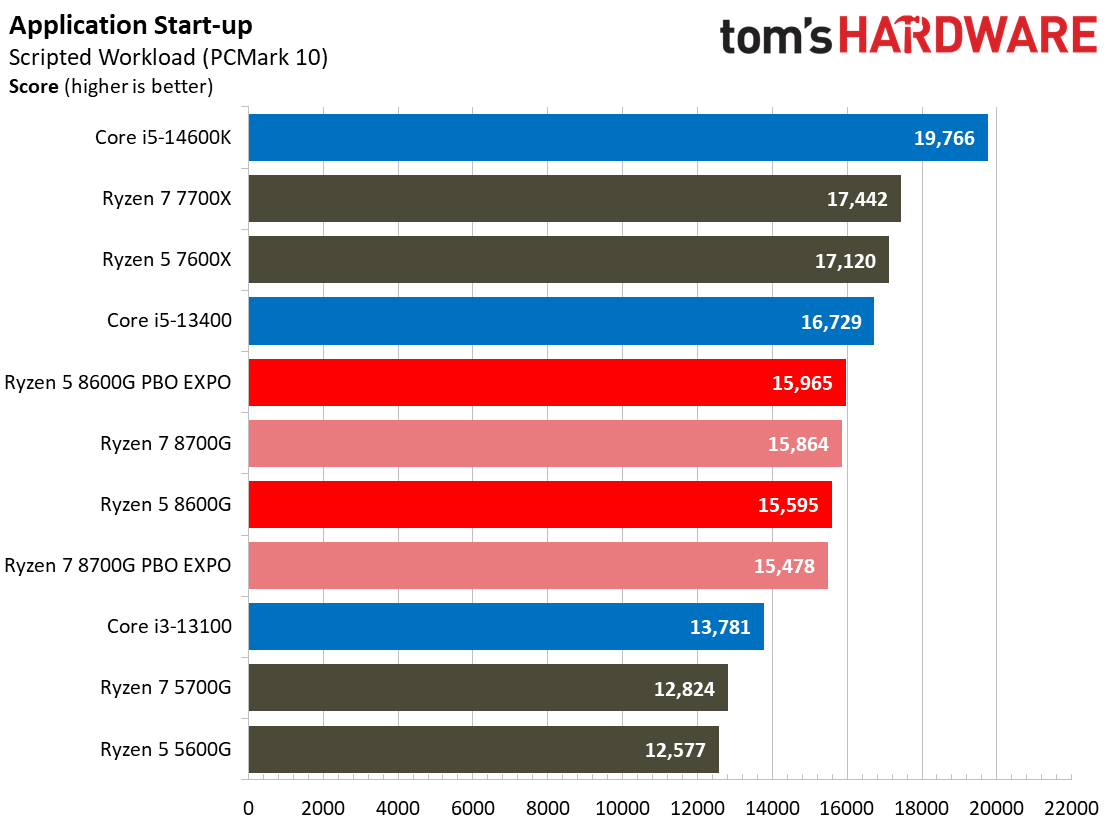
Web browser and office applications are ubiquitous the world over. Given its pricing and target audience, the Ryzen 5 8600G won't be noticeably slower in basic office and web apps than other like-priced chips in the chart.
Compilation, Compression, AI Chess Engines, AVX on AMD Ryzen 5 8600G
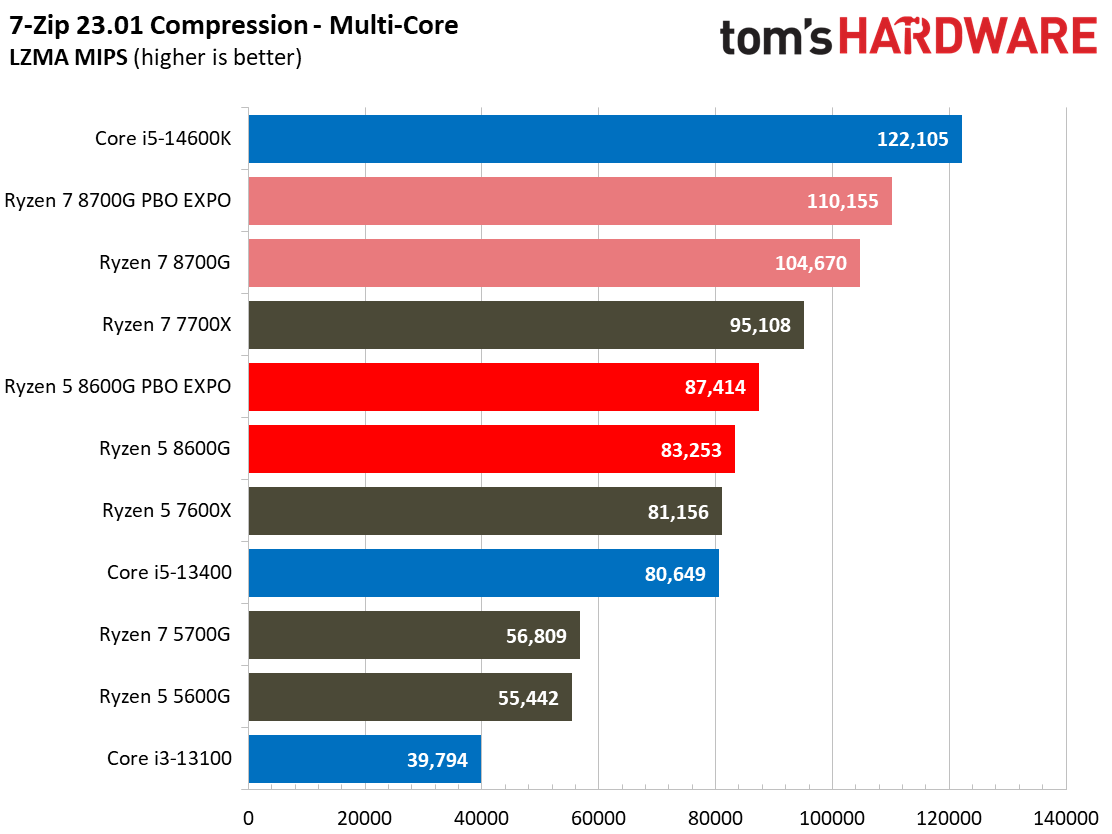
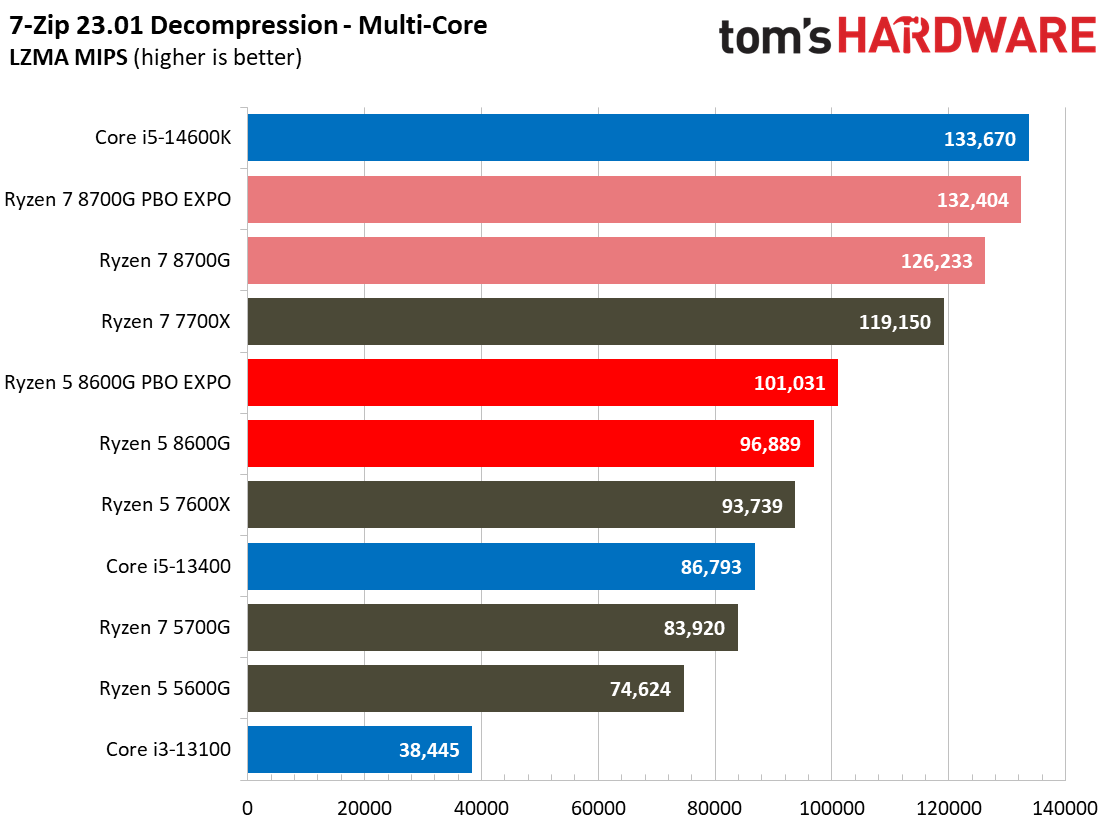
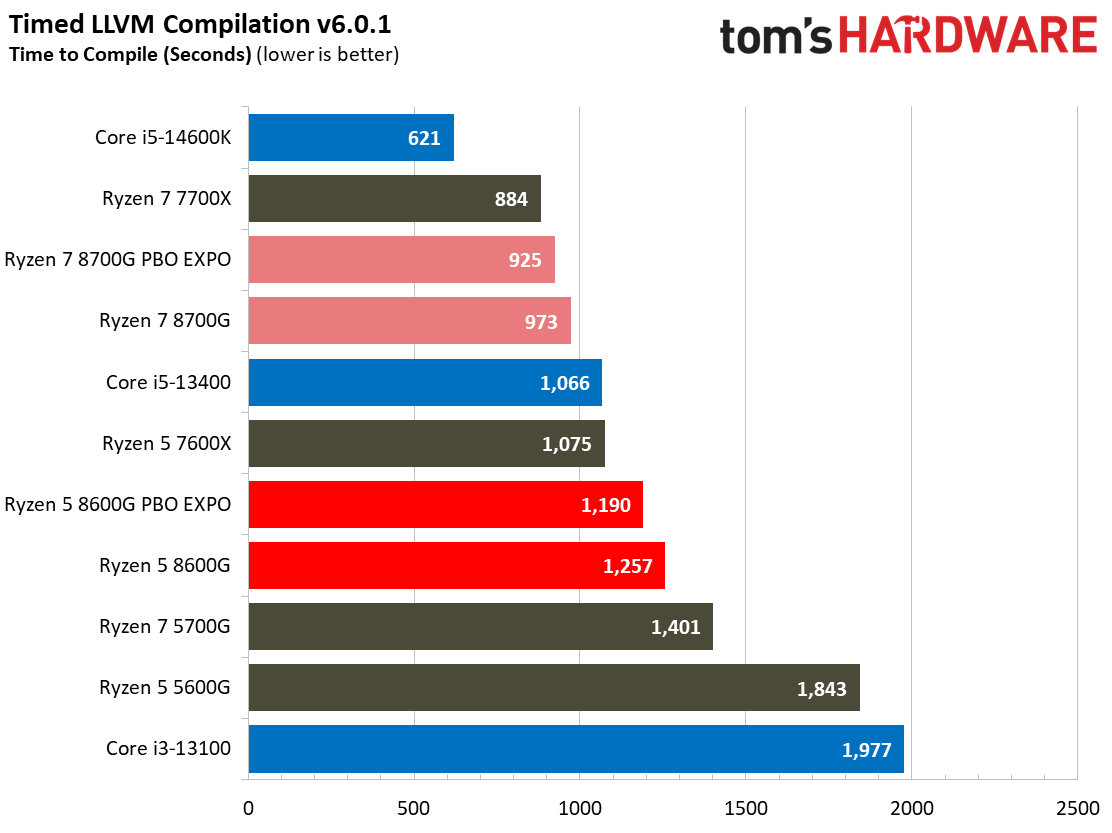
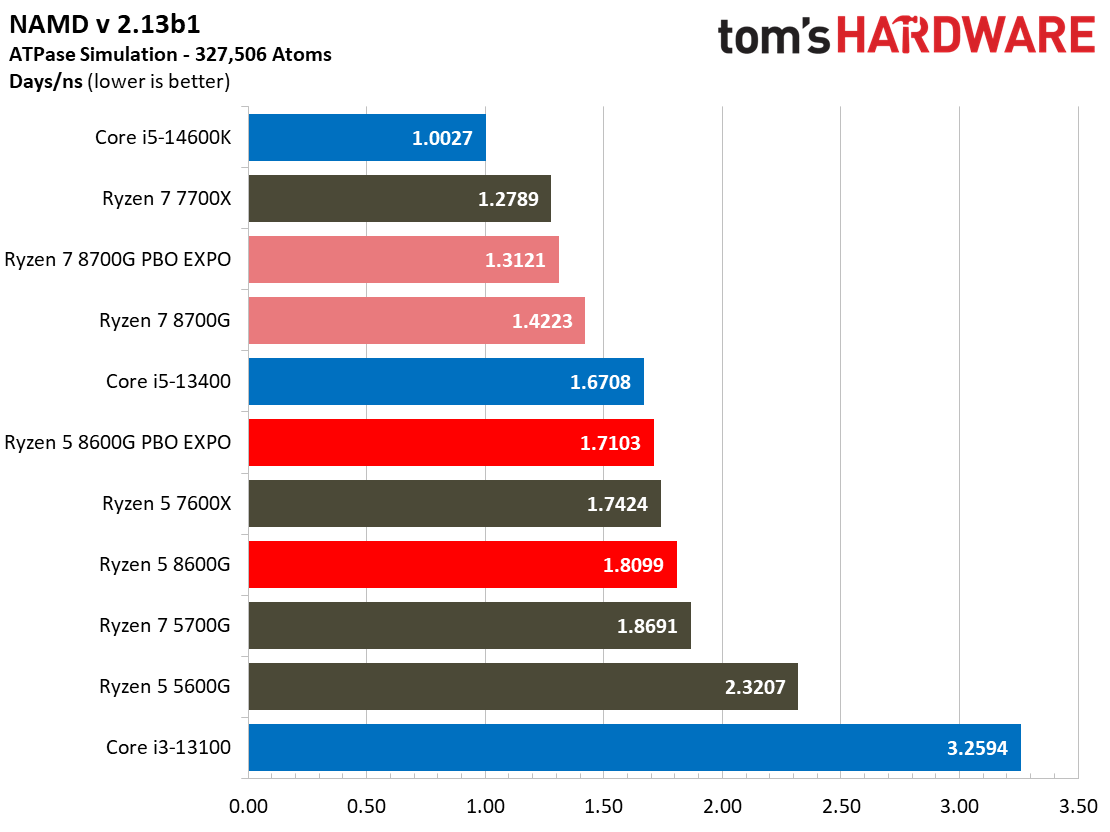
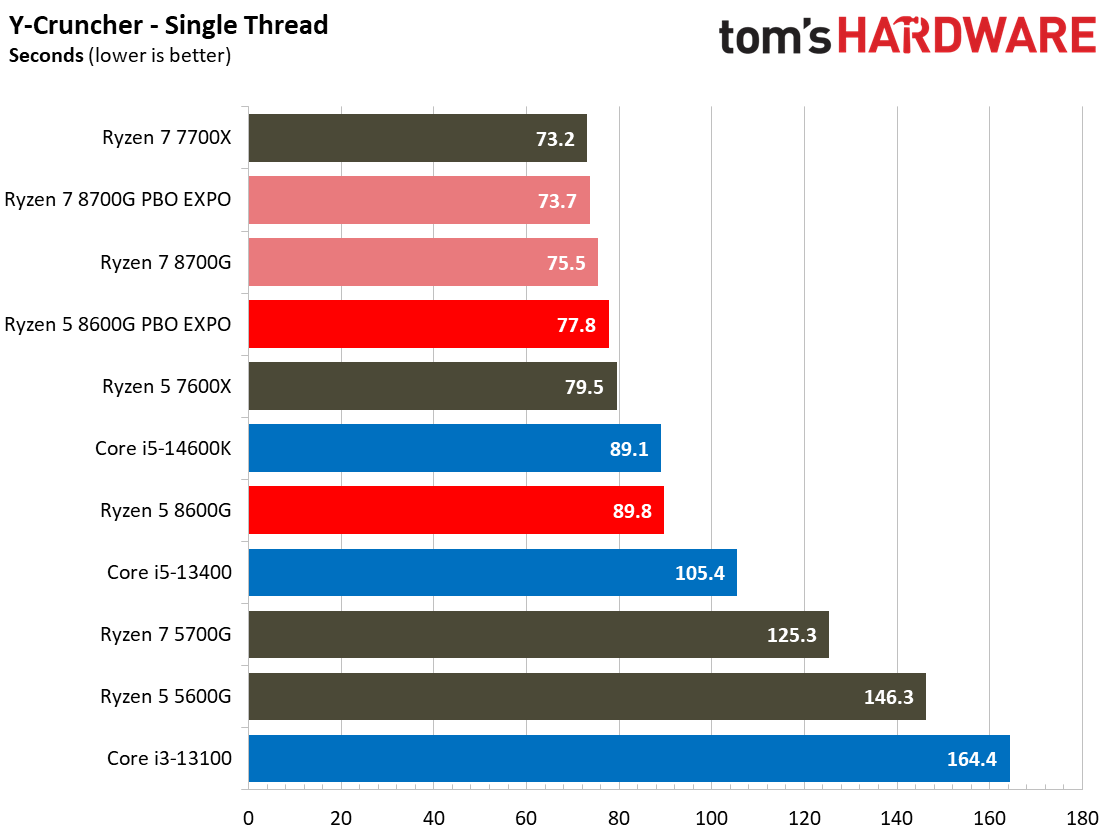
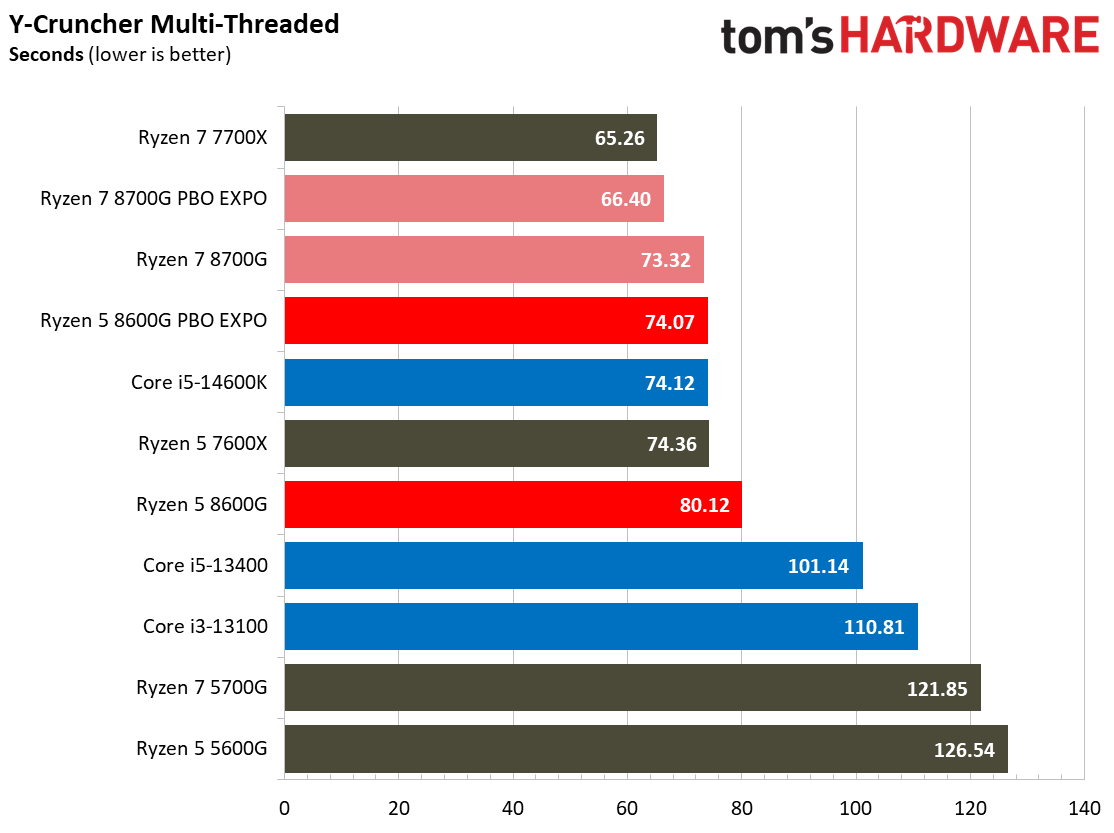
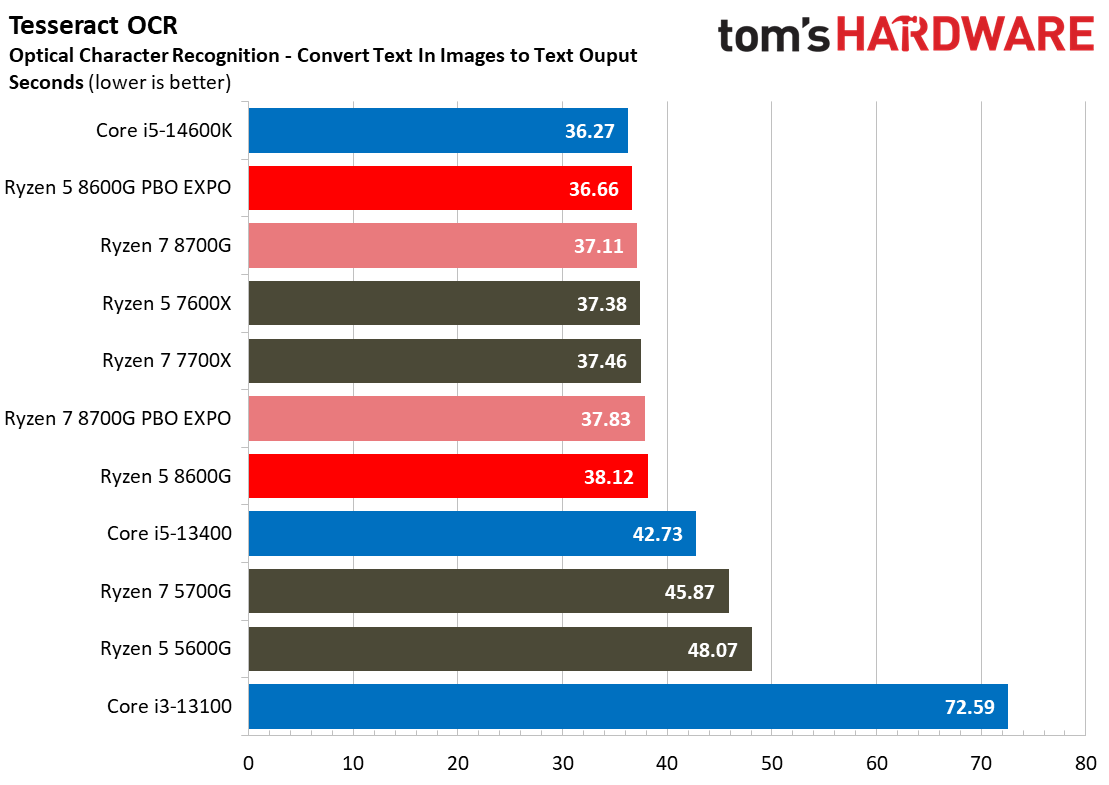
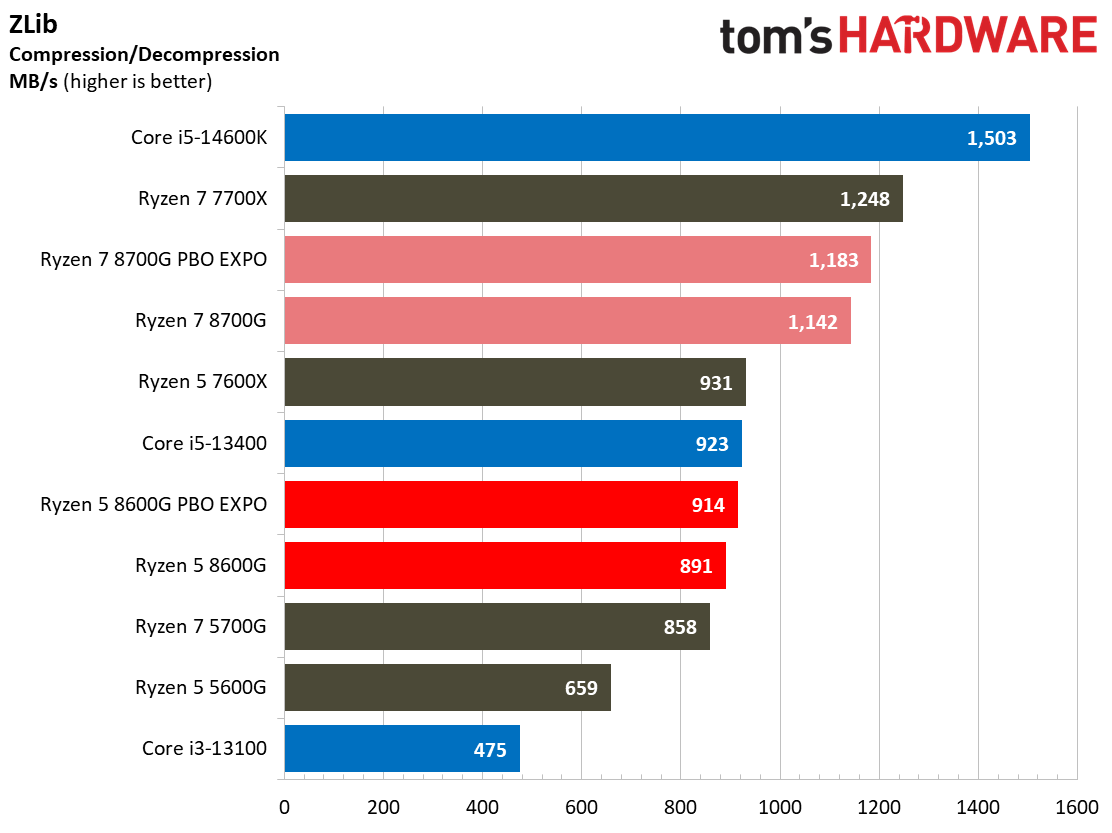
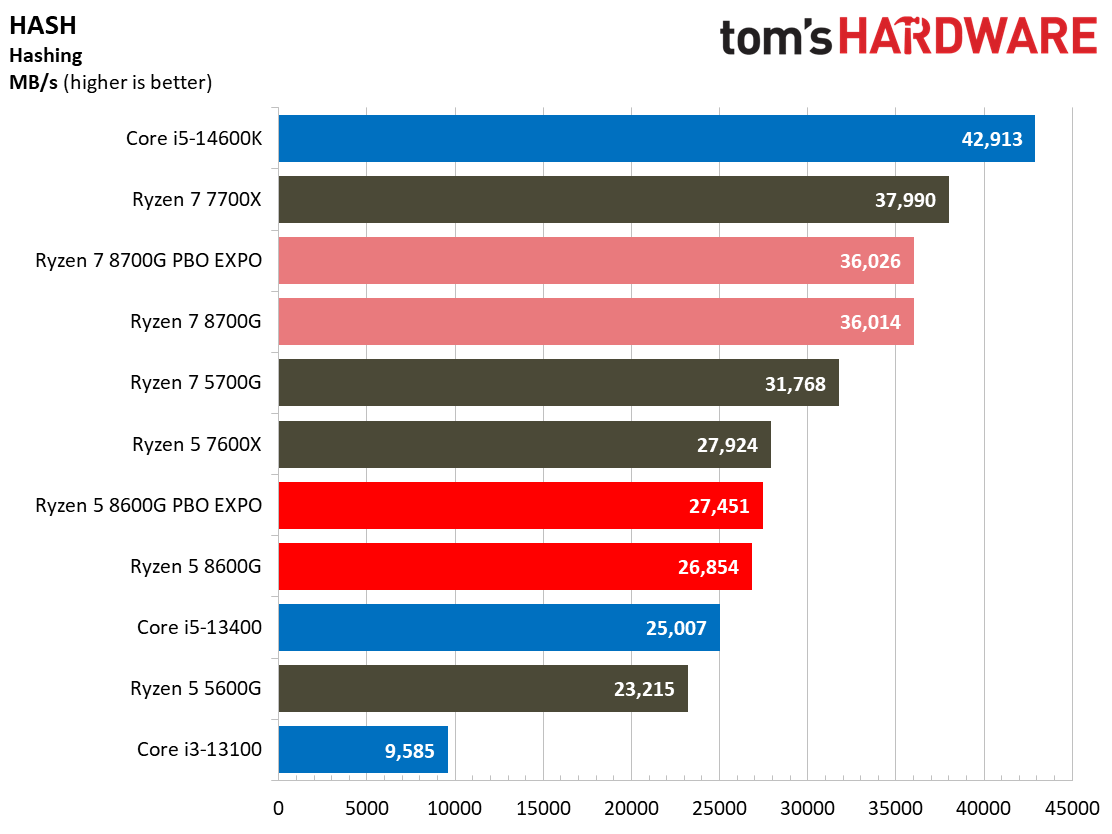
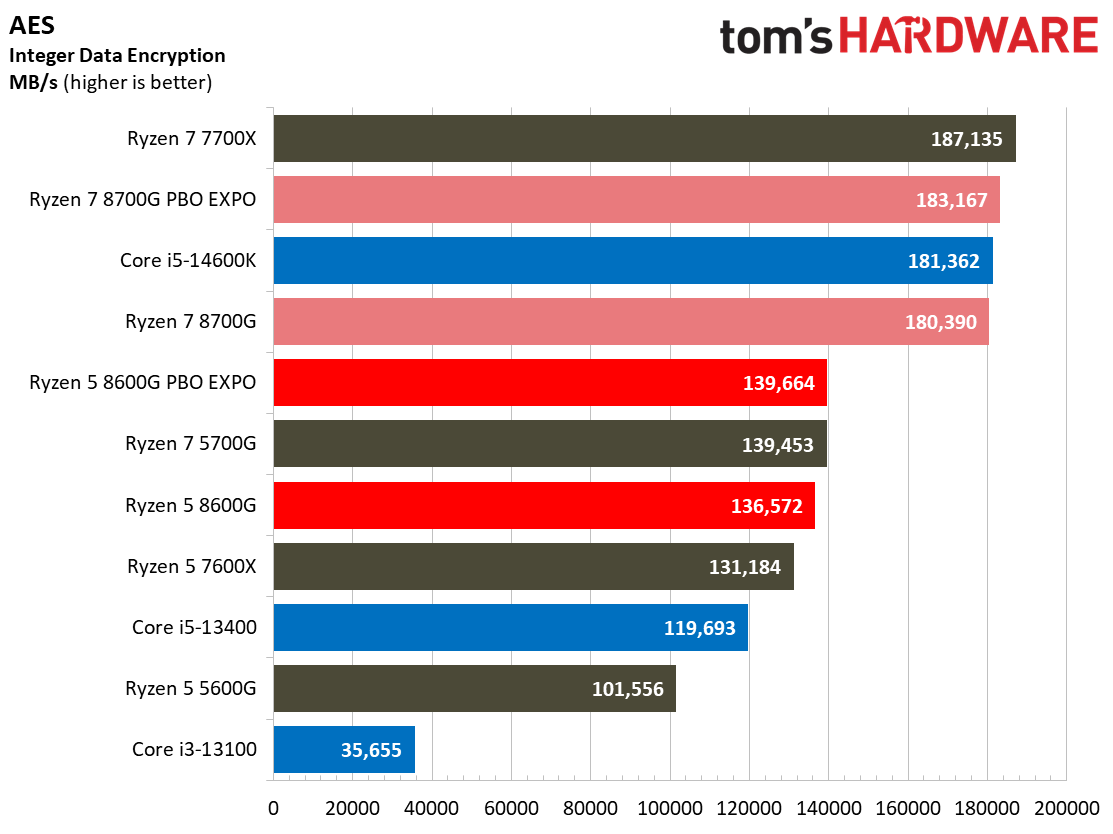
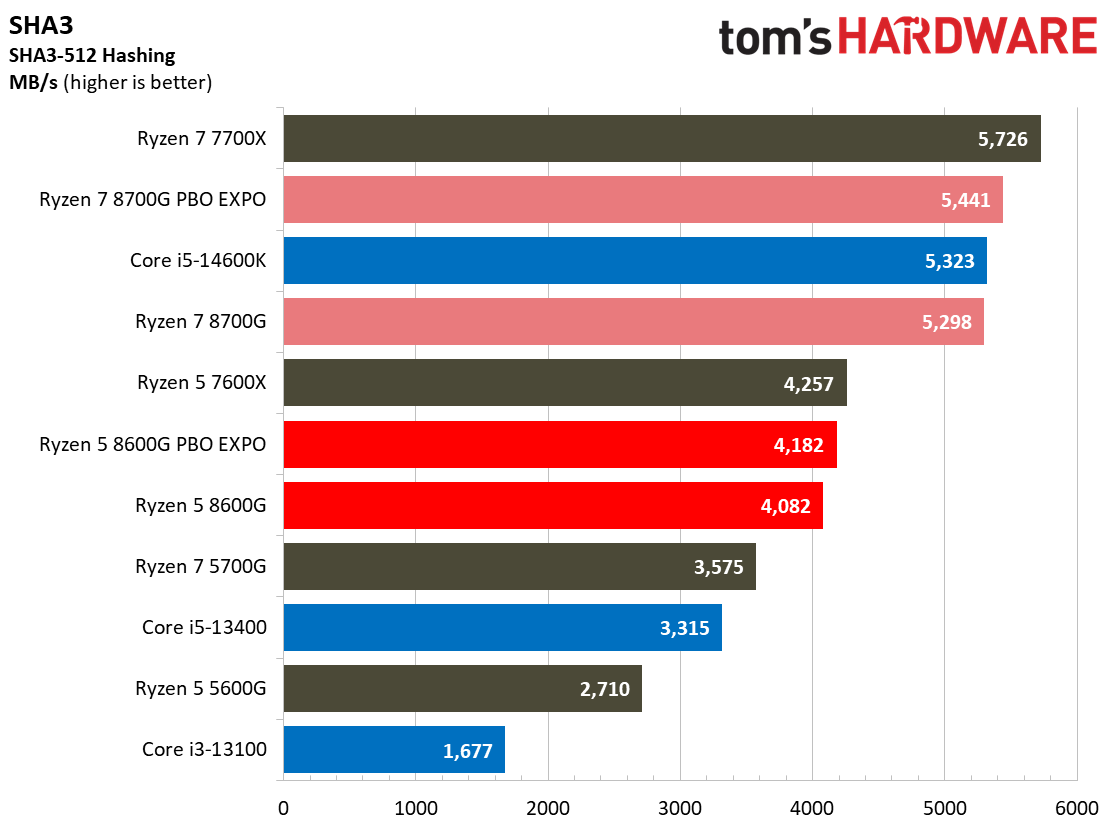
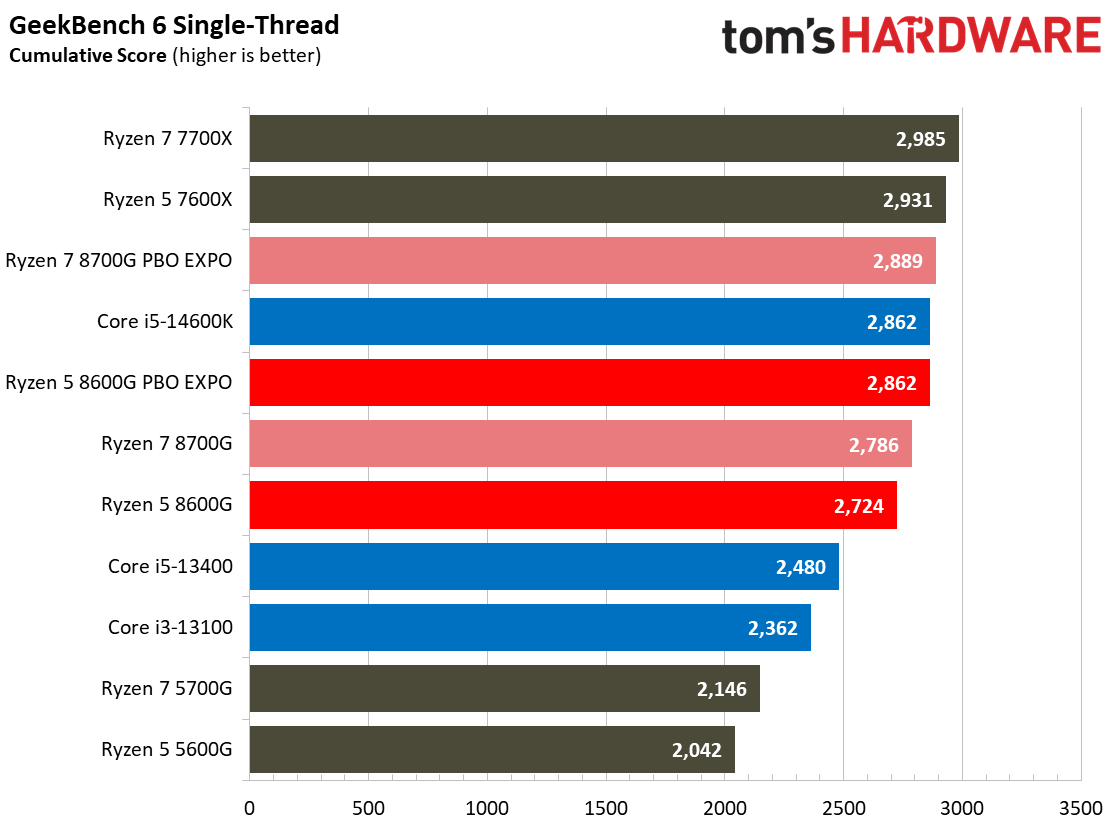
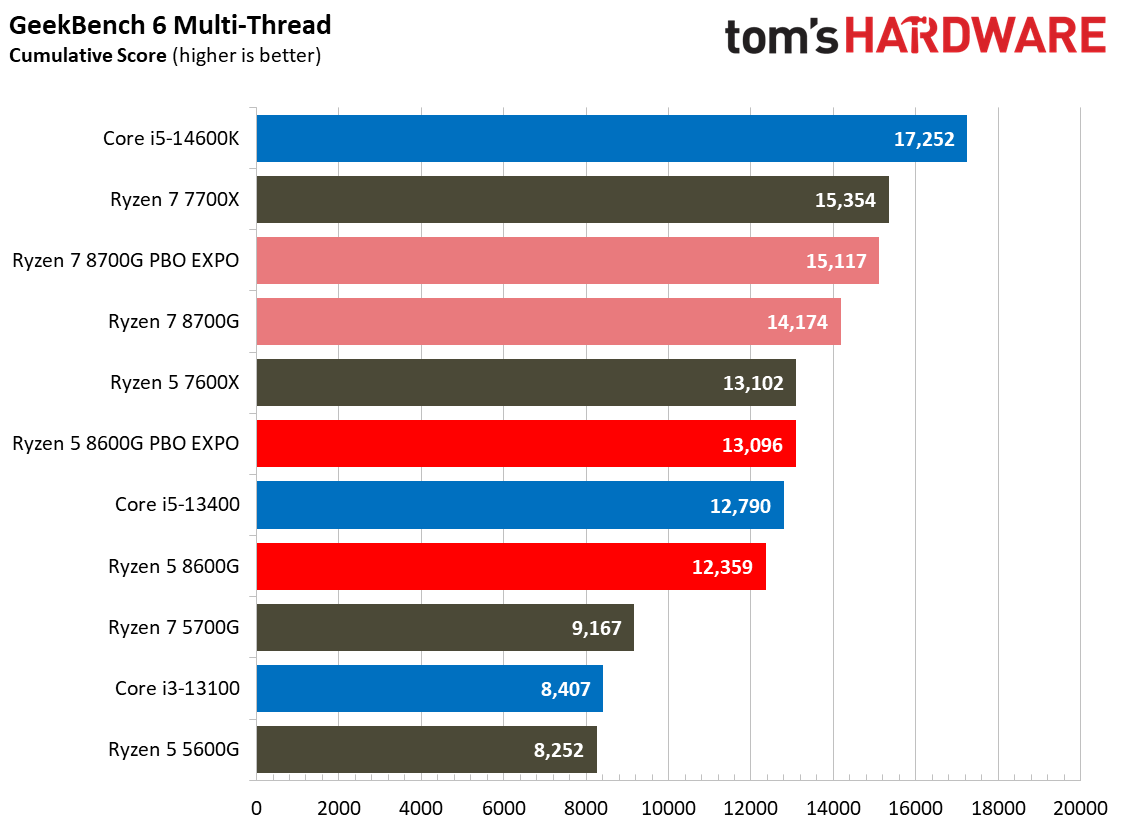
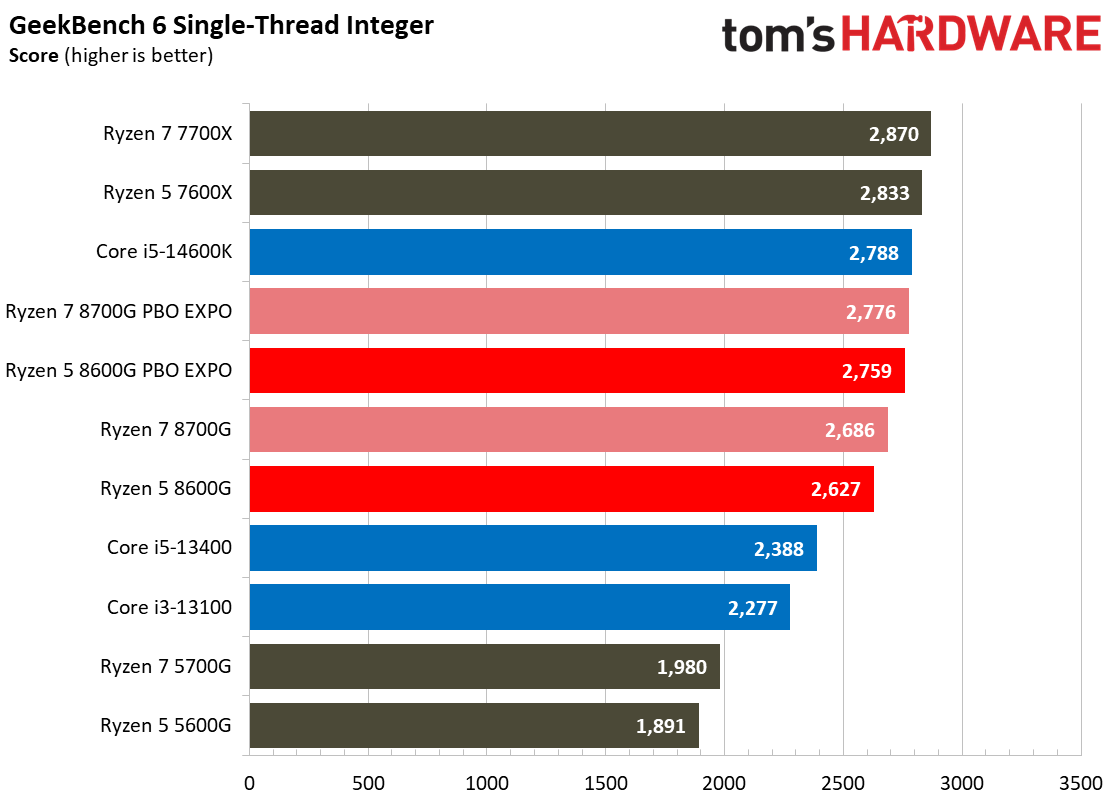
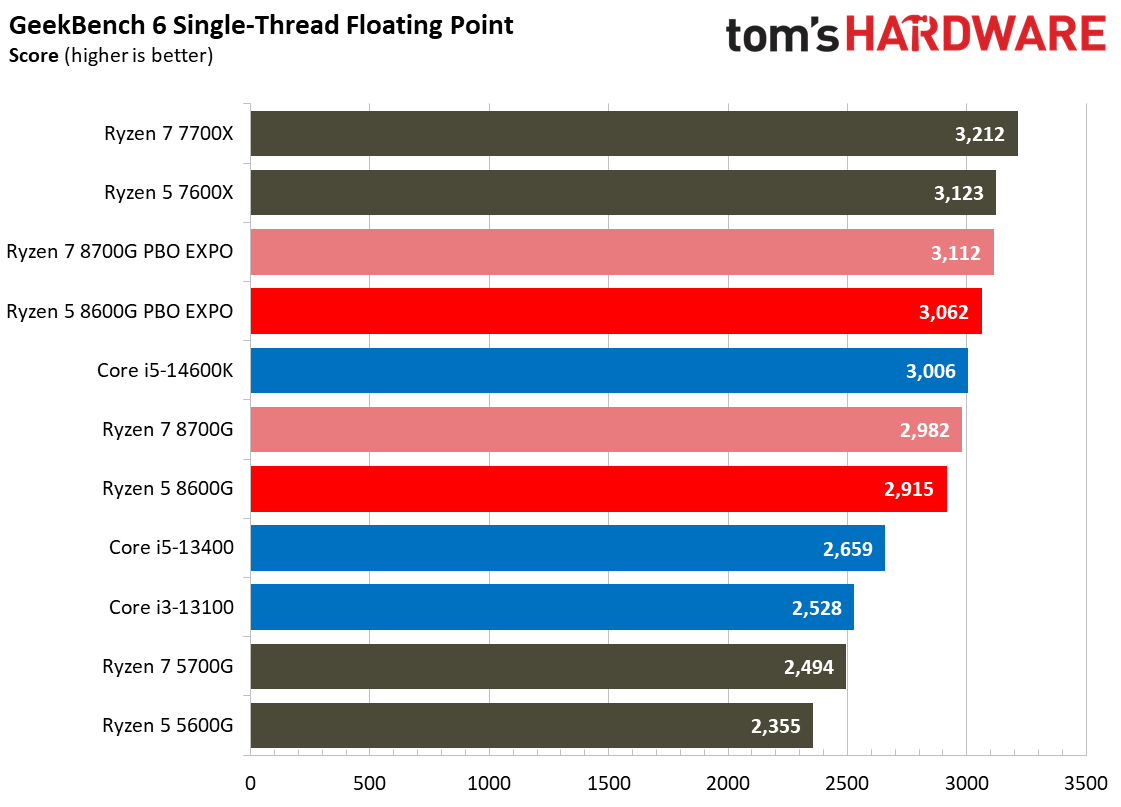
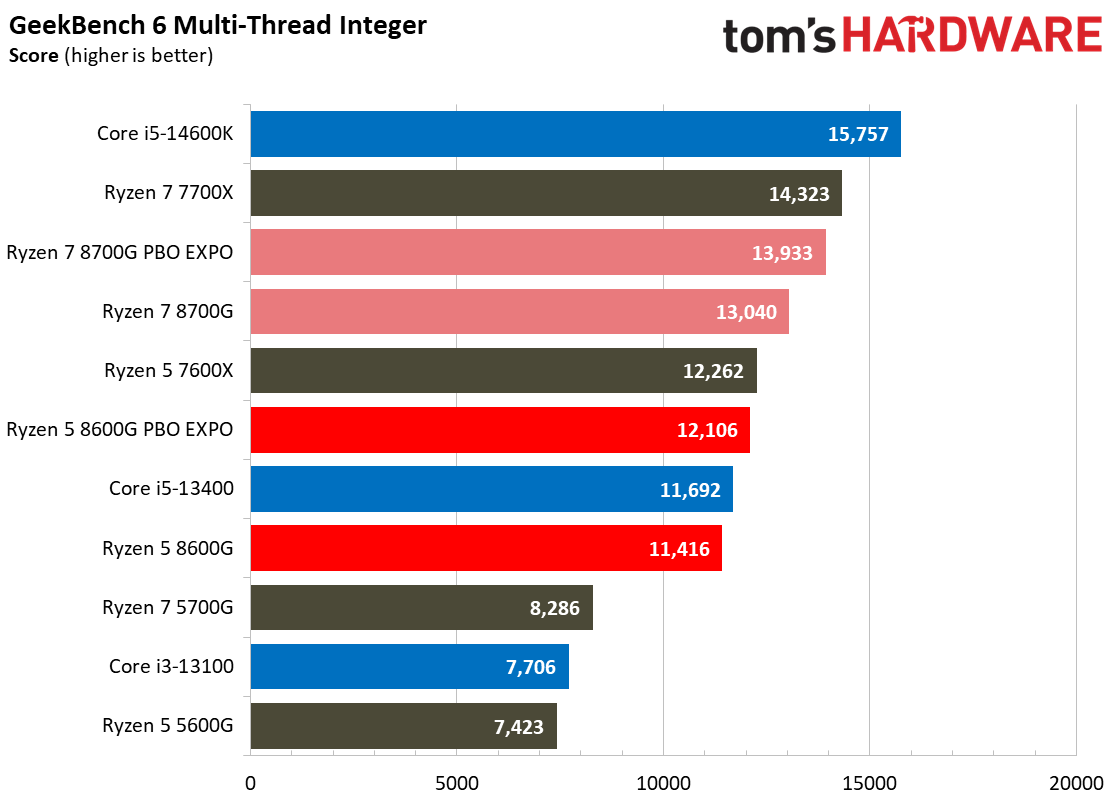
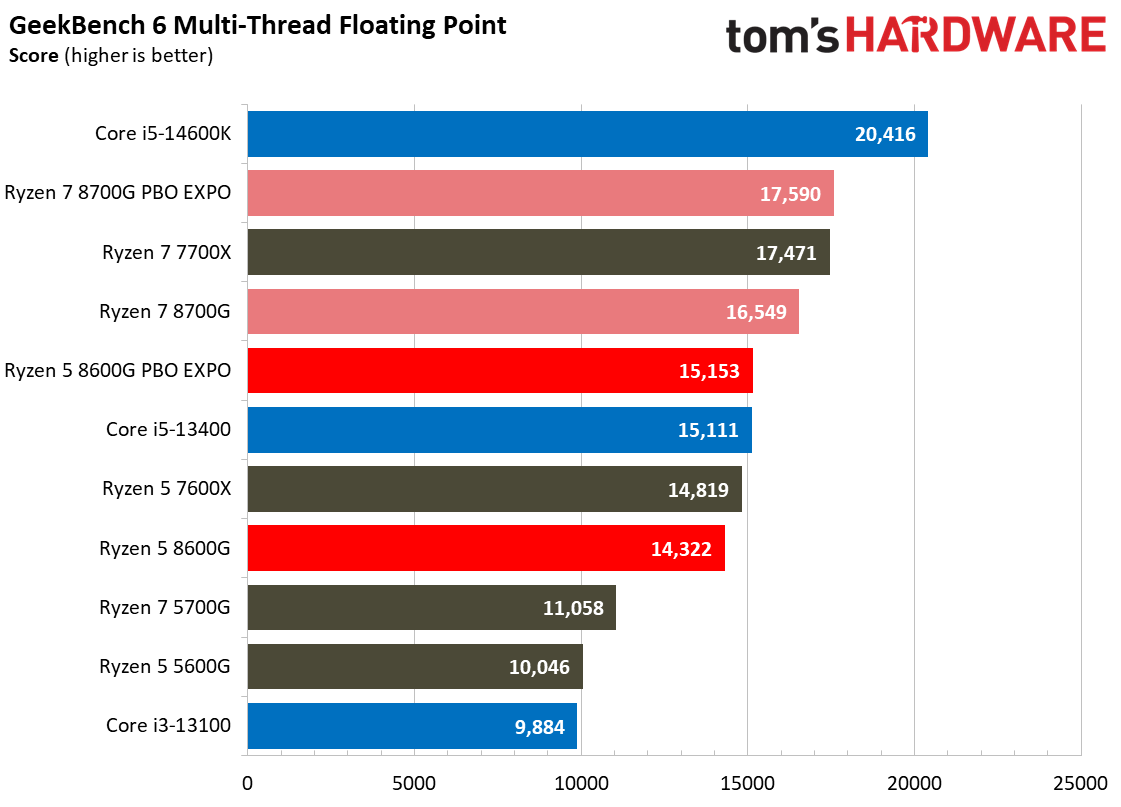
This selection of tests spans from massively parallel molecular dynamics simulation code in NAMD to compression/decompression performance. Y-cruncher computes Pi with the AVX instruction set, making for an incredibly demanding benchmark.
These tests aren't too relevant to the target audience for this class of chip, but we include them for completeness. They do highlight the generational gains from moving from the Zen 3 architecture to Zen 4, though.
Get Tom's Hardware's best news and in-depth reviews, straight to your inbox.
Current page: AMD Ryzen 5 8600G Application Benchmarks
Prev Page AMD Ryzen 5 8600G Discrete GPU Gaming Performance Next Page Not the best value, but still a better value than the flagship
Paul Alcorn is the Editor-in-Chief for Tom's Hardware US. He also writes news and reviews on CPUs, storage, and enterprise hardware.
-
Notton Considering how the Core 5 135H is looking, I really wish AMD enabled the full 12CU from this chip.Reply -
usertests APUs are screaming for more memory bandwidth, and the 8600G will look great if it hits the low prices seen for the 5600G along with other platform costs getting cheaper.Reply -
baboma >The current-gen flagship APU, the Ryzen 7 8700G, is 10% faster than the 8600G, but it costs $100 (44%) more, making the 8600G the clear value winner for this generation of APUs.Reply
This is incorrect, because you do not use the APU by itself, but as a part of a system. The correct value calculation is to take the price delta of the entire system but with different APUs.
Assuming a $1K SFF build, the $100 APU price diff would come out to ~10%, which is the same perf diff between 8700G and 8600G. AMD did its pricing homework. The value proposition is the same for both APUs.
I agree both are niche, as their main appeal would be for small SFF (eg NUC), and in that space, mobile parts, eg MTL & AMD 780M parts, may have more functionality and be better value.
>...the 8600G will look great if it hits the low prices seen for the 5600G along with other platform costs getting cheaper.
That'll happen if you're willing to wait ~2 years until the 9600G's release.
5600G pricing was very stable, staying close to its $259 launch price, and only gradually dropping after the 7000 series release on Sep'22.
https://camelcamelcamel.com/product/B092L9GF5N -
jeremyj_83 "Higher DDR5 pricing, no 8GB options"Reply
I am so tired of hearing about DDR5 pricing being a con. While it is more expensive, you won't have a choice for a new CPU in the Zen 5 or 15th Gen anyways. Not to mention due to the added bandwidth the 8600G averages 72% more iGPU performance at 1080p vs the 5600G. If you are looking at doing only iGPU gaming that added cost is minimal compared to extra performance. The lack of an 8GB option is also not a con. Gaming on 8GB is with a dGPU isn't good, unless it is old games. Doing it on an iGPU can kill your performance completely. -
SunMaster I think in most cases the APU will be preferable over the CPU with the old graphics card.Reply
If price is your only reason to go for a system like this, and you badly want to game, the APU isn't the best solution. But case/enclosure size, heat and noise will be the primary reason to choose the APU. The fact that you actually can game on it will what makes the sale. -
Reply
A few years ago I played through the entirety of Star Wars Jedi: Fallen Order on a Ryzen 3200G (no dedicated GPU) and with a 4GB x 2 kit of RAM. The Series S also works fine with what is functionally only 8 GB of RAM shared between the CPU and GPU (there's technically +2 GB for a total of 10, but the extra 2 GB is clocked slow and is for the OS). Memory needs tend to be overstated.jeremyj_83 said:The lack of an 8GB option is also not a con. Gaming on 8GB is with a dGPU isn't good, unless it is old games. Doing it on an iGPU can kill your performance completely. -
jeremyj_83 Reply
Have you tried to do basic work on a computer with Win 10, 8GB RAM, and 2GB RAM reserved for the iGPU? It is painfully slow as you are page swapping all the time. Any computer that isn't a Chromebook should come with less than 16GB RAM now.HopefulToad said:Memory needs tend to be overstated. -
kyzarvs Reply
My desktop is a 32GB ram machine. I also have an i7 / 32gb / 2TB nvme gaming laptop.jeremyj_83 said:Have you tried to do basic work on a computer with Win 10, 8GB RAM, and 2GB RAM reserved for the iGPU? It is painfully slow as you are page swapping all the time. Any computer that isn't a Chromebook should come with less than 16GB RAM now.
When I want portability on the road, I have a dell notebook that's education-oriented. 4GB ram, no fans, small CPU. It runs 10/11 perfectly well, starts up quickly and performs my work requirements (Office / Firefox / NextCloud) pretty much as quick as my main machines. -
mitch074 Erm... Error in the article : Zen3 was using 7nm, not 12 - AMD dropped 12nm with Zen 2 and RDNA.Reply
